

PRINCIPAL’S WELCOME
Dear prospective student, Rochdale Sixth Form College (RSFC) is one of the best sixth form colleges in the country. The college is extremely proud of its outstanding academic performance and the support that it provides for young people. The college particularly prides itself on the value that it adds to students, in terms of higher grades and achievement in both A level and Applied General/BTEC qualifications, and in terms of progression to university, apprenticeships and employment. Having recently retained its Ofsted ‘Outstanding’ status, the college is in a superb position to welcome the next generation to study and to succeed.
We employ specialist teachers and support staff who love working with young people. Having a wide range of courses to choose from, and with outstanding advice and guidance, you are well placed to select and study courses that will support both your progression and career aspirations, and to have a learning experience that you will really enjoy!
It is the intangible things that make RSFC so successful. RSFC has a reputation for valuing every individual. There is an unrelenting commitment to nurturing and developing the potential within every student and every member of staff. Our students are hard-working, tenacious and exhibit exemplary behaviour. Our staff are highly skilled and devoted professionals, dedicated to making a real difference to the lives and life chances of our students. In acknowledging this, Ofsted reported, ‘Teaching staff create highly purposeful and productive learning environments that enable students to flourish.’
As a student, learning and growing with us will be an experience that will stay with you always.
Once having studied here, you will forever be a member of the RSFC family and always be warmly welcomed back.
I do hope that you will come and join us.
Best wishes,
Karl Smith Principal

WE ARE OFSTED OUTSTANDING
We are celebrating again at Rochdale Sixth Form College as Ofsted awards us an Outstanding grade for the second time in a row after an inspection in October 2022.
We were awarded Sixth Form College of the Year by the TES in 2021, and have been one of the top-performing in the country since we opened in 2010.
We achieved outstanding in all criteria inspected, including: quality of education, behaviour and attitudes, personal development, leadership and management, and provision for learners with high needs.
“Staff have high aspirations for their students, including those with special educational needs and disabilities. They know their students very well. Teaching staff create highly purposeful and productive learning environments that enable students to flourish academically and personally.”
Ofsted October 2022
WE PROVIDE SPECIALISED, DEDICATED AND PERSONALISED ACADEMIC AND PASTORAL SUPPORT
OUR STUDENTS ACHIEVED 60% HIGH GRADES
ENRICHMENT ACTIVITIES TO EQUIP YOU WITH THE SKILLS TO SUCCESSFULLY PROGRESS TO YOUR CHOSEN COURSE OR CAREER
OVER 75% PROGRESSION TO UNIVERSITY
WE OFFER A UNIQUE ASPIRE+ PROGRAMME TO PREPARE YOU FOR PROGRESSION TO THE MOST PRESTIGIOUS UNIVERSITIES AND COURSES
WHY CHOOSE RSFC?
OUTSTANDING PASS RATES
RESULTS NEWS 2023
ANOTHER YEAR OF OUTSTANDING RESULTS
We are thrilled once again to celebrate another year of outstanding student results with an excellent pass rate and an increase in high grades compared to prepandemic benchmarks. These outstanding results have been achieved through the students’ commitment and dedication, which has filled our entire college community with immense pride.
Almost all of RSFC students have already secured their next educational stage at university, employment or apprenticeship. The transition to university is exceptionally high, with approximately 76% of students progressing to their firstchoice university, an incredible 27% obtaining a place at the most prestigious ‘Sutton 30’ institutions and furthermore, two of our students being accepted into the renowned Oxbridge universities.
Beyond this, an increasing number of students have successfully secured highquality apprenticeships and employment in a wide range of fields, including accounting, engineering, quantity surveying, and construction with companies such as Greater Manchester Police, KPMG and Barclays Bank.
This year’s results show the determination, resilience, and tireless commitment demonstrated by both our remarkable students and dedicated teachers. Their joint pursuit of academic excellence has brought about this year’s outstanding achievements.
RESULTS
3/4 OF RSFC STUDENTS PROGRESS TO HIGHER EDUCATION










DESTINATIONS













RSFC prides itself on the quality of the guidance and support students are given when identifying the right route for them after studying here, whether that be university, apprenticeships or employment. Because of this our students progress to a broad range of universities and courses from Medicine and History to Zoology and Spanish
28% WENT ON TO STUDY AT A SUTTON 30 UNIVERSITY









DESTINATIONS AFTER RSFC
Students progress to a range of university destinations. In 2023 students have progressed to universities across the UK including:
• THE UNIVERSITY OF MANCHESTER
• LANCASTER UNIVERSITY
• UNIVERSITY OF LEEDS
• UNIVERSITY OF YORK
• MANCHESTER METROPOLITAN UNIVERSITY

• UNIVERSITY OF SALFORD
• QUEEN MARY UNIVERSITY LONDON
• UNIVERSITY OF CAMBRIDGE
• UNIVERSITY OF OXFORD
• NEWCASTLE UNIVERSITY
THE UNIVERSITY OF LIVERPOOL
• UNIVERSITY OF NOTTINGHAM
• THE UNIVERSITY OF GLASGOW
EDGE HILL UNIVERSITY
• DURHAM UNIVERSITY
• UNIVERSITY OF CENTRAL LANCASHIRE




THE UNIVERSITY OF SHEFFIELD
KING’S COLLEGE LONDON
THE UNIVERSITY OF WARWICK
LIVERPOOL JOHN MOORES UNIVERSITY
Many other students have gone on to secure apprenticeships and work opportunities across the UK and worldwide!
• CASEY CONSTRUCTION
BARCLAYS BANK
ALICE MYERS CALDER LEARNING TRUST

WHAT IS ASPIRE?






Student Performance and Development Leaders (SPDLs)
Tutorial Programme
Enrichment
Social Development
Trips & Visits
Aspire is our comprehensive package of support and development opportunities to ensure you achieve your potential academically, and develop the skills and aptitudes you need to be successful, responsible citizens.
At RSFC we want to ensure that everyone who comes through our doors has the support and challenge needed to enable them to achieve their ambitions, whatever these may be.
We believe that the goal of education is to empower and enable you to become a critical thinker, able to take your place in the world as a global citizen. To help with this we provide you with the following opportunities and support:
Student Union
Progression Support
What do our students say?
Students describe their experiences at college as ‘heart-warming’, ‘enjoyable’, ‘rewarding’, ‘motivational’ and ‘safe’ (Ofsted 2022).
We are a large college but are proud of our ‘family’ feel; it is this, among other things, that sets us apart from other colleges.
STUDENT PERFORMANCE AND DEVELOPMENT LEADERS (SPDL s)
We have a specialist team of Student Performance and Development Leaders (SPDLs) at RSFC who are here to support you throughout your time at college and beyond. When you join RSFC we get to know you really well so that we can help you achieve your full potential. Your SPDL will be your critical and professional friend while you are studying with us. You will meet with them each week in a group tutorial and you will have regular one-toone meetings to talk exclusively about you!
Your SPDL will help you settle quickly into college life, and they will work with you to ensure you achieve the best results possible. Your SPDL will help you to think about your goals, set targets to enable you to reach those goals and track your progress.
Being a sixth form student is about being an independent learner and being able to self-evaluate, which means recognising your strengths and areas for development, and taking responsibility for your own learning. Your SPDL will have a clear overview of your academic and personal development while at college, and they will support you on your journey to success.
They will be a central supportive figure in your transition from school to college, as well as supporting and guiding you in all aspects of your progression to higher education and employment. Your SPDL will be the point of contact for your teachers and your parents/ carers to discuss any aspect of your progress and welfare. All of your SPDLs are also fully trained Mental Health First Aiders.
TUTORIALS
You will have two timetabled tutorials per week; one with your Student Performance and Development Leader (SPDL) and a second, larger tutorial in the theatre; this session is generally delivered by external speakers to consolidate the learning delivered in the SPDL tutorial. Delivery in the theatre is lecture-style to give you a flavour of what post-18 learning could look like to support your progression where appropriate.
The tutorial programme is mapped out over two years and addresses in full the KS5 PSHE Programme of Study, including:
• Health and wellbeing
• Relationships
• Living in the wider world
Each week in tutorial you will look at local, national and international inspirational leaders and consider what qualities they have; what is it that makes them inspirational? Is it something they were born with or does it develop over time? Our intention is to show you that background is irrelevant; anyone can become an inspiration to others.
Recent examples have included Kamala Harris (first female Vice President of the United States), Laverne Cox (first transgender person to be nominated for an Emmy Award) and Azeem Rafiq (cricketer who highlighted institutional racism within the sport).
We have a wide range of external speakers who are passionate about sharing their expertise and knowledge with you. We have a number of speakers visit from different universities and also a range of speakers who are experts in their field. Some of the speakers we have hosted this year have spoken on subjects including:

• Sophie Lancaster Trust (hate crime)
• Digital profiles
• Positive masculinity
• Sarah’s Story (domestic abuse)
• Motivational speakers
• Resilience and mental health
• What is a respectful relationship?
ENRICHMENT BESPOKE PROGRAMME
There is more to life at RSFC than gaining your qualifications. We want you to achieve your potential in and out of the classroom. That is why all students at RSFC complement their academic studies by taking part in our extensive enrichment programme. Enrichment teaches you new skills and builds on your existing subject knowledge to make you stand out from the crowd when applying for university or employment.
All students engage in a bespoke enrichment programme, which focuses on developing essential skills to support your progression to higher education and employment.

Some of the skills developed and promoted in enrichment include:
Communication
Confidence
Critical thinking
Independent research
Lateral thinking
Presentation skills
Problem-solving
Resilience and resourcefulness
TERM 1
In your first term, you will choose a ten-week programme, on either the Pre-Graduate or Pre-Professional Pathway:
The Pre-Graduate Pathway is based on specific subject areas and is designed to consolidate and develop your knowledge in preparation for a university application. Some Pre-Graduate programmes link directly to existing A level subjects, whereas others are intended to bridge the gap between sixth form and a university course.
The Pre-Professional Pathway is based around a career, rather than an academic subject, and is designed to develop your understanding of a specific job role. You will learn about the skills and knowledge needed for a certain type of employment and in some cases have the opportunity to undertake a related work placement.
Below is a sample of the Pre-Graduate and Pre-Professional enrichment activities; a full list of all enrichment activities is available on our website and in the enrichment booklet.
PRE-GRADUATE
Astrophysics
Biochemistry
Criminology
Gender Studies
Medical Society
TERM 2
PRE-PROFESSIONAL
Networking and Cybersecurity
Introduction to Accountancy
Pre-Nursing
Share Trading
Video Editing
In the second term, you will have a choice of selecting another Pre-Graduate or Pre-Professional programme or choosing a Wider Skills enrichment. The Wider Skills enrichment activities are varied in nature and aim to give you the chance to develop new skills that go beyond traditional classroom study.
The following are examples of Wider Skills enrichments that were available for students in the last academic year:
College Musical
Duke of Edinburgh
First Aid
British Sign Language
Sports Teams - Football/Netball
Aikido
SOCIAL DEVELOPMENT
As part of your social development, we expect you to become active and responsible citizens in the local and wider community. To facilitate this all students participate in the Social Development Programme; currently this includes activities such as befriending the elderly, community support, fundraising and gardening.
In summary, the intent of Aspire is to enable and empower you to achieve your full potential, leaving college with a set of standards and values which prepare you for the future.
TRIPS AND VISITS
 SKI TRIP (AUSTRIA)
SKI TRIP (AUSTRIA)
At Rochdale Sixth Form College, you will have the opportunity to take part in an exciting range of academic excursions and activities. With every subject area committed to offering at least one trip during the two-year period of study, you will have a variety of opportunities to gain experience beyond the classroom.
Our commitment to making extracurricular opportunities accessible for all students is reflected in the way that most trips are at least partly subsidised by the college.
In the 2022/2023 academic year we ran over 35 trips - these included:
RESIDENTIAL TRIPS:
Marine Biology (Scotland)
Ski Trip (Austria)
Duke of Edinburgh
Geography Fieldwork (Lake District)
Cambridge Residential (University of Cambridge)
PE (Thornbridge Outdoors)
DAY VISITS:
STEM Experience Day (The University of Liverpool)
Battlefields (York)
Houses of Parliament
Sociology Day (University of Leeds)
Investment Challenge (The University of Manchester)
Apprenticeship Festival (Manchester Metropolitan University)
Women in Maths (The University of Manchester)
Law Taster Day (University of Huddersfield)
Curve Theatre (Leicester)
RESIDENTIAL EXPERIENCES:
Ski Trip to Austria
Some of our trips are residential, and include both national and international destinations!

STUDENT UNION

 CAKE SALE
CHRISTMAS JUMPER DAY FOOD DONATION
CAKE SALE
CHRISTMAS JUMPER DAY FOOD DONATION
Rochdale Sixth Form College places a very strong emphasis on the involvement of its students in the running and organisation of the college. We are keen to ensure that you shape our future direction and we seek your views through focus groups, questionnaires and the Student Union.
The Student Union is involved at all levels of the college, acting as a link between the senior leadership team and the student body. They represent students in all matters concerning their education and help to promote the general welfare of students. They are also responsible for organising and implementing many of the major
SU THE
FOR MORE INFORMATION ABOUT JOINING OUR STUDENT UNION, CONTACT SARAH TURNER
VIA EMAIL: s.turner@rochdalesfc.ac.uk
student events in the calendar each year. All events organised by the Student Union aim to promote change, raise awareness or raise donations.
Events this year have included:
Cake Sale and
the RSFC Great British Bake Off
Christmas Jumper Day
Clothes Swap
Culture Day
Mental Health Awareness Week
Year 13 Leavers Celebration
Previous charity partners have included Springhill Hospice, The Sanctuary Trust, British Heart Foundation, Rochdale Foodbank and the Mental Health Foundation.
INDIVIDUALISED SUPPORT
ACHIEVEMENT CENTRE
The Achievement Centre is a large study space that is open to all students to use in their study periods. It is also open before and after lessons and is staffed at all times throughout the day.
It is a quiet space that allows you to complete independent study from your lesson content as well as engaging in wider reading and research.
The Learning Support Officers (LSOs) are always on hand to help you with study skills, organisation and time management, to name just a few.
The Achievement Centre has computer stations and tables to allow you to work on all aspects of your subjects.
You may be referred to the Achievement Centre by your SPDL for a short ‘placement’. When on placement, you receive support from the LSOs to help you work towards targets set by your teachers.
ADDITIONAL LEARNING NEEDS SUPPORT
In addition to working in the Achievement Centre, our dedicated team of Learning Support Officers (LSOs) work with students with a range of additional learning needs and use specialist knowledge and equipment to ensure all students are on a level playing field. Examples of support include working one-to-one with you in the classroom, or meeting you outside of lessons to keep track of your progress
THE COLLEGE COUNSELLOR
At RSFC we have a specialist British Association for Counselling and Psychotherapy (BACP) registered counsellor who is available to provide a variety of counselling techniques tailored to support your individual needs at the earliest opportunity.
When required, the counsellor will also refer to, and work alongside, external agencies to provide holistic support for you.
In addition to the one-to-one counselling, the college counsellor aims to promote emotional wellbeing by improving your knowledge and understanding of mental illness and helping you to build on your skills to gain emotional resilience.

EMPLOYABILITY & CAREERS



BUSINESS BREAKFAST
RSFC is committed to ensuring that all our students are supported to develop an appropriate career plan and encouraged to take part in a career placement during their time here. Impartial one-to-one careers advice and guidance is available for all students at RSFC. In the first instance, your Student Performance and Development Leader (SPDL) will give you advice on education and work opportunities, as well as assisting you with your applications for universities, apprenticeships or employment. We offer one-to-one interviews, careers workshops and access to a range of careers resources and software.
Your SPDL will work with you to plan your opportunities for progression and will support you in finding relevant career placements. It is our aim to offer all students a career placement before they leave college, to support applications for further study and employment. RSFC students have been successful in securing career placements with a range of organisations in health, law, construction and financial establishments.
A number of students who have attended these placements have also been offered employment once their studies were completed.
For some university courses, a career placement is an essential part of the entry requirements, including initial teacher training and all healthrelated courses. If you study a BTEC diploma, you will complete a career placement as part of your course, this can be self-sourced or may be sourced by the college.


CAREERS
RSFC has established a wide network of partnerships which has enabled us to offer relevant and valuable career placements. In addition, you will participate in careers and apprenticeship events, volunteering, visits to local organisations and a mock interview. We also welcome a variety of guest speakers to the college from a range of organisations.

ASPIRE+
The Aspire+ programme aims to equip you, as a supplement to your academic provision, with skills in academic research, debating and critical thinking. This is to aid you for the rigorous admissions processes for competitive courses, such as Medicine, Dentistry and Veterinary Science, as well as applications to Oxbridge and popular courses at Sutton 30 universities. Universities, more so than ever before, are now expecting future academics to possess a repertoire of core skills that are not only vital to succeeding at undergraduate level, but are essential to creating adaptability in the ever-evolving twenty-first century workplace.
As part of the Aspire+ programme, you will have a twelve-week timetabled, extra-curriculum programme in a subject area of your choice. This is delivered by subject specialists and provides learning that goes beyond taught units.
If you achieve five or more grade 7s at GCSE, you will be eligible to join the Aspire+ programme.
As part of the Aspire+ programme, you will receive:
An opportunity to complete the Extended Project Qualification (EPQ)



Individualised preparation and support when applying for challenging and competitive university courses, including Oxbridge, Sutton 30, Medicine, Dentistry and Veterinary Science

Additional one-to-one ‘stretch and challenge’ work with your subject teachers
Opportunities to participate in various access programmes from prestigious universities such as Oxford, Cambridge and Manchester
Organised visits and conferences including trips to the country’s leading universities

Talks by guest academic speakers
Access to academic resources and electronic texts in various university libraries

OXBRIDGE

RSFC has established links with the Oxbridge universities, with staff from both visiting the college. If you are interested in applying to Oxford or Cambridge, not only will you enjoy specialist one-to-one advice on the application process, you will also have the opportunity to visit one, or possibly both, of the universities.
In addition, RSFC participates in both OxNet and HE+ programmes, which allows you to attend taster sessions and visit the University of Cambridge in preparation for future study.
EPQ
EXTENDED PROJECT QUALIFICATION
The Extended Project Qualification (EPQ) is a qualification that allows you to develop and enhance your abilities beyond the A level specification. The EPQ is worth half an A level (up to 28 UCAS points) and is recognised by universities and employers, with many universities making lower offers to students undertaking an EPQ.
This is an excellent qualification for you to show prospective universities that you have the autonomy to pursue interests through academic research and reporting of topics that are not covered in your A level subject lessons. If you are applying for competitive courses after RSFC, then the EPQ will help you stand out, giving you the chance to explore a topic area you have a passion for, providing an excellent addition to personal statements and university interviews.
SCHOOL OF MATHS
For those students who have performed particularly well in Mathematics at GCSE, the college offers you the opportunity to be part of our School of Maths programme.
The school provides weekly seminars to challenge your thinking; these bespoke sessions take place in small groups and are led by experienced teachers who will engage the group in extended discussions about unfamiliar problems. The school has strong links to prestigious universities and our programme includes Oxbridge-style supervision to prepare you for the selection process. You will learn how to apply your knowledge and draw on your experiences to develop ideas and research.
The School of Maths includes a weekly programme of visiting speakers, specialist careers advice, preparation for university entrance exams and allows you to join a variety of extra enrichment opportunities. The school is supported by Mathematics in Education and Industry, the Advanced Maths Support Programme and the Institute of Mathematics and its Applications.
To be part of the School of Maths you must be studying Mathematics and Further Mathematics or AS Further Mathematics, alongside a combination of Computer Science, Physics, Chemistry or Economics, though other subject combinations will be considered.
SCHOOL OF ENGLISH
For those students who have performed particularly well in English at GCSE, the college offers the opportunity to be part of our School of English programme.
The School of English at RSFC provides an opportunity to study texts, context, literary theory that goes beyond the specification. This is tailored for high achieving students who are studying English alongside other humanities subjects, such as History, and will provide support and help for applications to the most prestigious universities.
There will be a bespoke programme on offer, covering Medieval history and literature to postmodernism and critical thinking. You will have weekly sessions with specialist subject tutors as well as doing subject masterclasses with some of the top universities. The content covered in conjunction with the skills will not only help you excel in your subjects, but will provide an enjoyable challenge for you if you flourished in GCSE English.
SUCCESS
ARIANA SANCA TAVARES
COURSES:
RESULTS:
ST CUTHBERT’S RC HIGH SCHOOL
DESTINATION:
Applied Science
Psychology D*D* B
Manchester Metropolitan UniversityBiomedical Science

JACKSON MCGUIRE MIDDLETON TECHNOLOGY SCHOOL
COURSES:
English Language Law Politics
RESULTS:
A A A
DESTINATION: The University of ManchesterLaw
PROGRAMME OF
We offer a wide variety of subjects, ranging from the traditional to those that aren’t normally available in secondary schools. We have 31 courses on offer, and you have the flexibility to combine almost any of them.
The majority of year 12 students study three A level subjects. Further options include studying a combination of a BTEC diploma, with a single A level/BTEC extended certificate or two A levels with a BTEC extended certificate.
As well as your chosen subjects you will have at least one hour of enrichment, a group tutorial and a lecture each week. You will also participate in the RSFC Social Development Programme to give something back to your community and to develop essential life and employability skills.
Throughout the year you will attend one-toone sessions with your Student Performance and Development Leader (SPDL), as well as any other sessions as necessary.
In year 13, you will continue to study the subjects from year 12 plus a group tutorial and a weekly lecture. There is also the opportunity for students, as part of our Aspire+ programme, to complete the Extended Project Qualification (EPQ).
When applying to study with us, you will select four A levels or a BTEC diploma and two A levels to discuss at interview. You will be offered a place on three or four A level courses, or one BTEC and one A level course, dependent upon your predicted GCSE grades and your progression plans. We will make sure that you are placed on the best programme to ensure your success.
OF STUDY
ENTRY REQUIREMENTS:
A minimum of five GCSEs (or equivalent) at grade 4 or above, including GCSE Mathematics and/or English Language are required for entry to RSFC.
A good school reference, attendance and behaviour record are also required, as is a positive college interview.
A few courses have specific entry requirements; relevant details can be found on the individual subject information pages.
Choosing subjects to study at sixth form college is both exciting and demanding. RSFC has a firm commitment to ensuring that you start and finish on the course that is right for you.

We place great emphasis on pre-course guidance to ensure that your subject choices are appropriate and match your aspirations. Here are some hints and tips on choosing the right subjects for you:
Think about any future progression plans you are considering. This could be a particular higher education course or career that you are really interested incheck the entry requirements and any specific subjects that you need to achieve your goals
Choose subjects that you are good at - this will give you the best chance of achieving your potential
Choose subjects that you enjoy! You are much more likely to achieve your potential in subjects that you enjoy studying
Discuss your future plans with us at your interview so we can offer advice and guidance on the most appropriate programme of study
ATTEND AN OPEN EVENT
Speak to subject teachers and current students about the courses that you are interested in. Be sure to ask any questions that you may have.
SAT 14 OCTOBER OPEN DAY 10am - 2pm Last entry 1:30pm
OPEN EVENING 4pm - 7pm Last entry 6:30pm
THURS 23 NOVEMBER
SUBJECTS WHAT WILL I STUDY?
A LEVELS
With 26 different A level subjects to choose from, there is something for everyone! An A level is a two-year programme, with the completion of formal examinations at the end of the two years. Some subjects include an element of coursework and/or controlled assessment.
BTECS
A BTEC diploma is a vocational qualification that involves applying your learning to real-life scenarios, allowing you to develop essential skills and knowledge for employment within a particular industry. BTECs are assessed through the completion of assignments with ‘real-world’ application. There are also examined units as part of the course. Please see the individual subject pages for more information.
We offer the following BTEC subjects:
Applied Science
Business
Health & Social Care
Information Technology
You will study three or four A levels or a BTEC diploma alongside an A level.
We also offer the following BTEC extended certificate which is a single subject BTEC, equivalent to one A level:
Applied Psychology
Many of the subjects will be familiar to you, but there are some you may not have heard of before. It may help you to consider the following questions:
What subjects do I think I will enjoy?
What subjects am I likely to be successful in?
What subjects will I need to study for my chosen career?
SUBJECTS
All of our subject guides can be found on our website and will be available at our open events.
We expect to offer the following courses next year, subject to staffing and demand:
Applied Psychology (BTEC)
Applied Science (BTEC)
Art & Design
Biology
Business (BTEC)
Business
Chemistry
Computer Science
Drama & Theatre
Economics
English Language
English Literature
Film Studies
French
Further Mathematics
Geography
Health & Social Care (BTEC)
History
Information Technology (BTEC)
Law
Mathematics
Media Studies
Music
Physical Education
Physics
Politics
Psychology
Sociology
Spanish Statistics
Theology, Philosophy & Ethics
SUBJECTS
WHAT WILL I STUDY?
SUBJECTS APPLIED PSYCHOLOGY BTEC
WHAT IS APPLIED PSYCHOLOGY (BTEC)?
Much like A level Psychology, Applied Psychology (BTEC) studies the human mind and behaviour in everyday life. However, the way in which the course is assessed differs from the A level, with a combination of coursework and an exam in each year. The course aims to challenge contemporary issues in modern-day life such as: Why do people develop gambling addictions? Why do I continue to purchase certain brands of clothing?
WHY STUDY THIS SUBJECT?
Applied Psychology (BTEC) will develop your understanding of the mind and human behaviour, equipping you with psychological theories that can be applied to everyday life. For example, how brands and companies encourage people to spend in certain ways or why people develop addictions to specific substances. Studying Applied Psychology (BTEC) will develop analysis and application skills, alongside enhancing communication and report writing through the coursework element of the course.
WHO IS THE SUBJECT SUITABLE FOR?
If you are interested in understanding the mind, the causes and treatment of mental illness, and creating your own piece of research then this is the course for you. Applied Psychology (BTEC) will enable you to delve into a range of different viewpoints to explain habits of human behaviour, the causes of addiction and psychopathology. This course is suitable for those students interested in Psychology who would prefer to be assessed via a combination of exam and coursework units rather than following the typical linear A level structure.
KEY TOPICS
YEAR 1
Unit 1: Approaches to explaining consumer behaviour, aggression and gender (Exam unit)
Unit 2: Research methods In Psychology (Coursework)
ENTRY REQUIREMENTS
WHAT CAN YOU EXPECT FROM APPLIED PSYCHOLOGY
(BTEC)?
You can expect interactive and informative lessons that will help you to develop knowledge of the different psychological approaches and how they explain consumer behaviour, aggression and mental disorders. You will participate in class debates and discussions to develop a deeper understanding of the subject, alongside forging independent research skills.
WHAT CAN I DO WITH A QUALIFICATION IN APPLIED PSYCHOLOGY (BTEC)?
Applied Psychology (BTEC) can help you progress to a variety of different career pathways and higher education opportunities. If you wish to become a psychologist, therapist or work with people who experience mental health difficulties, this course will be of value to you. Many students who graduate in Psychology build careers in education, policing, social work, sports psychology, advertising and business.
HOW IS THE SUBJECT ASSESSED?
You will study the Pearson BTEC Applied Psychology specification, which is assessed via a combination of coursework and examination. You will complete two exams overall - one in year 12 and one in year 13 – as well as two pieces of coursework.
50% Examination
50% Coursework
YEAR 2
Unit 3: Mental health and addiction (Exam unit)
Unit 6: Psychopathology –The study of severe mental illness (Coursework)
College entry requirements apply as detailed on page 29. This is a BTEC extended certificate, equivalent to one A level. You need to choose two A level subjects or a BTEC diploma alongside it.
APPLIED PSYCHOLOGY BTEC
SUBJECTS APPLIED SCIENCE
WHAT IS APPLIED SCIENCE (BTEC)?
A BTEC in Applied Science is a great choice for students looking for a practical scientific qualification. The course aims to provide you with the relevant skills and knowledge that employers value, as well as the confidence to progress into a fulfilling, exciting career.
WHY STUDY THIS SUBJECT?
Applied Science (BTEC) at RSFC offers you a practical hands-on approach to science with lots of opportunities to carry out experimental work in our state-of-the-art laboratories. Each unit is tailored to equip you with the skills you need to succeed at university and in the science industry. You will also explore the fundamentals that underpin scientific investigation.
WHO IS THE SUBJECT SUITABLE FOR?
If you enjoy science and are keen to develop your understanding of the practical applications of science within all areas of society then Applied Science (BTEC) is the subject for you.
WHAT CAN YOU EXPECT FROM APPLIED SCIENCE (BTEC)?
You will learn the most important aspects of Chemistry, Biology and Physics. Your skills will be assessed by practical activities and investigations within the laboratory, so you will learn how to use a wide range of laboratory equipment. You will also be asked to produce an assessment portfolio of your scientific investigations. This will involve developing your literacy, numeracy and research skills.
KEY TOPICS
YEAR 1
• Unit 1: Principles and applications of science 1 (Exam unit)
• Unit 2: Practical scientific procedures and techniques (Coursework)
• Unit 3: Scientific investigation skills (Exam unit)
• Unit 8: Physiology of human body systems (Coursework)
ENTRY REQUIREMENTS
BTEC DIPLOMA
WHAT CAN I DO WITH A QUALIFICATION IN APPLIED SCIENCE (BTEC)?
Applied Science (BTEC) will maximise your career prospects and widen your options for further or higher study. This course will enable you to explore a wide range of scientific fields and work in a variety of laboratory and research environments. You could choose to progress to higher education to study a science-related degree course such as Nursing, Radiography, Pharmacy, and a range of other health carerelated courses. Applied Science (BTEC) is also seen as a valuable qualification by employers and would suit any student who wishes to seek employment in a laboratory or science-related career or apprenticeship.
HOW IS THE SUBJECT ASSESSED?
There are three formal examinations within this qualification, so your exam technique and revision skills will be improved. The five remaining units are internally assessed and involve writing scientific reports based on experiments and research, so you will also be developing your skills in the laboratory.
YEAR 2
• Unit 4: Laboratory techniques and their application (Coursework)
• Unit 5: Principals and applications of science 2 (Exam unit)
• Unit 6: Investigative project (Coursework)
• Unit 14: Applications of organic chemistry (Coursework)
College entry requirements apply as detailed on page 29. In addition, a grade 4-4 or above in GCSE Combined Science or grade 4 or above in each of GCSE Biology, Chemistry and Physics.
The support received at RSFC has been outstanding and has enabled me to excel in my chosen subjects.
APPLIED SCIENCE BTEC
Ayesha Awais
SUBJECTS ART & DESIGN A level
WHAT IS ART & DESIGN?
Art is defined as the expression or application of human creative skill and imagination, typically in a visual form such as painting or sculpture, producing works to be appreciated primarily for their beauty or emotional power. It is a way of expressing yourself, your thoughts and feelings in relation to the world around you.
WHY STUDY THIS SUBJECT?
Studying Art & Design will inspire you to problem-solve and communicate in a creative and innovative way. You will explore and create a visual language which says something about the way you understand and perceive the world around you. This will enable you to develop and discover ways in which art can be a powerful tool to change perspectives and affect the attitudes of others. Using a variety of techniques and materials, you will have the opportunity to develop your own artistic interests and style reflecting your personal and cultural identity, the society around you and your place in the world. This qualification is an excellent progression pathway onto higher education. This is supported with opportunities to exhibit your work, residential visits, and the opportunity to undertake additional enrichment activities.
WHO IS THE SUBJECT SUITABLE FOR?
If you enjoy developing your ideas, working practically and are not afraid to be experimental with a variety of different materials, then Art & Design is the subject for you.
KEY TOPICS
YEAR 1
Workshop-led sessions will introduce you to a range of art studio materials and techniques.
These include:
• Specialist drawing and painting processes
• Printmaking
• Casting and sculpture
• Creative textiles
• Photography - both traditional dark room and digital processes
In the second term of study, you will select a suitable theme from 21 potential starting points including themes such as ‘urban & industrial’, ‘flaw & abnormalities’ and ‘deconstructing the figure’. Your personal investigation will be an independent project designed to develop high-level practical and thinking skills.
WHAT CAN YOU EXPECT FROM ART & DESIGN?
You will develop your skills working with different materials and techniques on a range of challenging scales. Projects will build on your existing skills from your GCSE and school studies, along with experimenting with new techniques and processes designed to help you plan for final pieces. You will be valued as an individual and encouraged to pursue areas of study that you feel passionate about, enabling you to develop your own approach as an artist.
WHAT CAN I DO WITH A QUALIFICATION IN ART & DESIGN?
Art & Design is a traditional and well-respected subject that can be combined with a variety of subjects to support progression to university. This qualification allows you to work in the creative industries with employment opportunities ranging from fashion, gallery or museum management, teaching, fine art practice, community arts, art therapy and wellbeing, funding and project management, events management, architecture, and interior design.
HOW IS THE SUBJECT ASSESSED?
Assessment is through a combination of coursework assignments and a controlled examination, including sketchbook work and a final piece.
60% Coursework 40% Examination
YEAR 2
You will complete your personal investigation started in year 12 with ambitious and challenging final pieces. You will consolidate your sketchbook of investigation with compositional planning and experimentation for your final pieces. In addition, you will start an exam sketchbook, which will give you a chance to explore new themes, materials and outcomes, all of which will be exhibited in an end of year show to celebrate your achievements.
ENTRY REQUIREMENTS
College entry requirements apply as detailed on page 29. In addition, you must achieve a grade 4 or above in GCSE Art. If GCSE Art is not studied, a comprehensive portfolio will be required for assessment by our staff.
I have been constantly encouraged to push my boundaries as an artist and I have been able to flourish working with a multitude of different mediums and disciplines.
 Emily Hall
Emily Hall
ART & DESIGN
SUBJECTS BIOLOGY A level
WHAT IS BIOLOGY?
Biology is the study of living organisms, from the molecular biology of virus replication to the study of animals and plants in their natural habitats. Biology is a fascinating subject and includes all the traditional areas of biology as well as the advances in areas such as epigenetics and recombinant DNA technology.
WHY STUDY THIS SUBJECT?
Biology has a wide range of interesting applications in research, drug and vaccine development, health care and the environment. Many of our students continue their study of Biology at university in such diverse fields as Marine Biology, Immunology, Genetics, Radiography, Environmental Health, Biomedical Sciences, Pharmacology, Medicine and Dentistry. Most medical courses demand that students have A level Biology. The transferable analytical and evaluation skills acquired in the study of biology are an excellent preparation for a wider range of courses.
WHO IS THE SUBJECT SUITABLE FOR?
If you have a particular interest in life sciences, with strong numeracy and literacy skills, and aim to go on to study a biological science-related degree, this is the subject for you.
WHAT CAN YOU EXPECT FROM BIOLOGY?
The Biology course covers a diverse range of topics from the fundamental biological processes and mechanisms at the molecular level in plants, animals and bacteria to whole eco-systems. The course will nurture your passion for biology and lay the groundwork for further study in courses like Biological Sciences, Medicine and Dentistry. Biology has a strong practical element, and you will have plenty of opportunities to study biological concepts in our well-equipped laboratories during your two-year course. We also offer a number of trips and guest speakers.
WHAT CAN I DO WITH A QUALIFICATION IN BIOLOGY?
Biology can lead to a wide range of university and career options. Biology students may choose to use their biological knowledge to study a science course at university or to study a health care-related course like Medicine or Dentistry. Alternatively, many students choose to use the skills they have acquired from their Biology course in other areas of work or study.
HOW IS THE SUBJECT ASSESSED?
Assessment is through examinations at the end of the two years. There are three two-hour papers: Paper 1 : Any content from topics 1–4, including relevant practical skills
Paper 2 : Any content from topics 5–8, including relevant practical skills
Paper 3 : Any content from topics 1–8, including relevant practical skills
100% Examination
The practical experiments that you will complete throughout the course will contribute to a practical skills certificate.
KEY TOPICS
YEAR 1
• Biological molecules
• Cells
• How organisms exchange substances with their environment
• Genetic information, variation, and relationships between organisms
ENTRY REQUIREMENTS
YEAR 2
• Energy transfers in and between organisms
• How organisms respond to changes in the internal and external environments
• Genetics, populations, evolution, and ecosystems
• The control of gene expression and gene technologies
College entry requirements apply as detailed on page 29. In addition, a grade 6-6 or above is required in GCSE Combined Science or a grade 6 or above in two of GCSE Biology, Chemistry or Physics. You must also achieve a grade 5 or above in GCSE Mathematics and a grade 4 or above in GCSE English Language.
Interactive lessons, comprehensive resources and teachers who offer unlimited support in and outside the classroom have helped me develop the skills I need for success and provided an unforgettable experience.
 Ara Barzinji
Ara Barzinji
BIOLOGY
SUBJECTS BUSINESS BTEC
WHAT IS BUSINESS (BTEC)?
Business (BTEC) is one of the most exciting subjects you can choose! Business (BTEC) includes real-life case studies where you will explore and critically review live departments in companies such as McDonald’s, Nike and Starbucks. You will develop into a resilient, determined and capable individual with an entrepreneurial spirit. By the end of the course, you will be employment ready and fully equipped with the tools to thrive in public, voluntary or private sector organisations.
WHY STUDY THIS SUBJECT?
Within this subject, you will gain a sense of direction for your future career in areas such as law, marketing and finance. You will be equipped with a range of knowledge from exploring real-life cases to visiting active, thriving businesses, and gaining an insight from experienced business professionals who visit the college. You will also take part in a work placement to gain real-life experience.
WHO IS THE SUBJECT SUITABLE FOR?
If you enjoy completing projects, working in teams, preparing business presentations, and taking a more practical approach to your studies, this subject is for you!
WHAT CAN YOU EXPECT FROM BUSINESS (BTEC)?
Business (BTEC) will allow you to develop a real understanding of what is involved, both theoretically and practically, in becoming an effective business professional. You will develop an in-depth understanding of the topics covered on the course.
WHAT CAN I DO WITH A QUALIFICATION IN BUSINESS (BTEC)?
You could go on to gain a role in a small or large organisation, start your own business or become a specialist in a particular area such as: marketing and advertising, finance and accounting, retail and sales, personnel development, or administration. Alternatively, the course offers a wide range of future opportunities through both university and apprenticeship programmes.
HOW IS THE SUBJECT ASSESSED?
This course is assessed through a variety of coursework projects and examinations. There are eight units, five of which are internally assessed and three of which are external assessments.
55% Internal Assessment
45% External Assessment
KEY TOPICS
YEAR 1
• Unit 1: Exploring business (Coursework)
• Unit 2: Developing a marketing campaign (Controlled assessment)
• Unit 3: Personal and business finance (Exam unit)
• Unit 8: Recruitment and selection process (Coursework)
ENTRY REQUIREMENTS
YEAR 2
• Unit 4: Managing an event (Coursework)
• Unit 6: Principles of management (Controlled assessment)
• Unit 5: International business (Coursework)
• Unit 16: Visual merchandising (Coursework)
College entry requirements apply as detailed on page 29. In addition, a grade 4 or above is required in GCSE Mathematics.
Studying A level Business has allowed me to understand how businesses function and operate as well as how they are able to become successful. This has truly been an exciting and dynamic subject that had me hooked.
Faheem Hussain
BUSINESS BTEC
COURSES:

JUDE CLARKE BEECH HOUSE SCHOOL

SUBJECTS BUSINESS A level
WHAT IS BUSINESS?
Business will enable you to uncover the truth behind the decisions made by businesses and the impact that these decisions have in the four key areas of: marketing, production, human resources and finance. We take an in-depth look at real-life business examples, from world leaders such as Adidas and McDonald’s to small local businesses, analysing the impact of their choices and predicting the likely outcomes.
WHY STUDY THIS SUBJECT?
From day one, Business will help you develop a critical mind to assess key business decisions. You will be trained in how to become an effective business consultant advising businesses on how to juggle the conflicts between a range of stakeholders to ultimately ensure that they are successful. You really will learn about the fine margins between success and failure and all the factors at play.
WHO IS THE SUBJECT SUITABLE FOR?
If you are interested in business and can see yourself one day working within a large organisation, or you are interested in starting up and running your own business, this is the subject for you!
KEY TOPICS
YEAR 1
• Introduction to Business: Discover how to get a business idea off the ground by exploring essential foundational topics such as:
Market research and positioning
Research and development
Break-even and cash flow
Sources of finance
Business ownership
• Business growth: Find out how a business develops from a local to regional to national brand by exploring topics such as:
Economies of scale
Price elasticity of demand
Leadership and culture
WHAT CAN YOU EXPECT FROM BUSINESS?
You will expand your understanding of how and why business decisions are made and how businesses respond strategically to the challenges they face. You will also study the major issues affecting people today such as the impact of the cost of living crisis and strike action.
WHAT CAN I DO WITH A QUALIFICATION IN BUSINESS?
Business leads to a very wide variety of university courses, especially in areas such as Business, Economics, Management, Retailing, Enterprise, Finance, Accountancy and Administration. It is a very useful starting point for careers in the business world.
HOW IS THE SUBJECT ASSESSED?
You will complete three examinations at the end of the two-year course.
100%
YEAR 2
• International Business: Assess the implications, and methods, of international growth by investigating topics such as:
Protectionism
Globalisation
Exchange rates
Political stability and corruption
Emerging markets
ENTRY REQUIREMENTS
College entry requirements apply as detailed on page 29.
In addition, a grade 4 or above is preferred in GCSE Mathematics.
My time spent studying Business has been extremely positive. The consistent and valuable support I have received from my teachers has played a significant role in enabling me to make steady progress towards achieving my goals.
 Kai Weldon
Kai Weldon
SUBJECTS CHEMISTRY A level
WHAT IS CHEMISTRY?
Chemistry is the study of matter, its properties, and how and why substances combine or separate to form other substances. It also involves the study of how these substances interact with energy.
WHY STUDY THIS SUBJECT?
You will develop your skills in problem-solving, analysis and the ability to understand and analyse complex data and abstract concepts. You will develop a vast range of skills that are transferable to further study and employment.
WHO IS THE SUBJECT SUITABLE FOR?
If you have an interest in science and a desire to develop a greater understanding of how physical sciences shape the world around us, then Chemistry is the subject for you.
WHAT CAN YOU EXPECT FROM CHEMISTRY?
The Chemistry course is split into two main sections: physical chemistry and organic chemistry. In physical chemistry there is a strong mathematical focus as you develop an understanding of quantities of atoms and energy. In organic chemistry you will learn how to synthesise many of the molecules we encounter in everyday life.
KEY TOPICS
YEAR 1
• Bonding: You will learn about how different types of atoms form different structures. These differences explain the different properties of materials we use day-to-day
• Amount of substance: The mathematical core of chemistry that will enable you to calculate the quantities of reactants and products in a reaction
• Organic chemistry: You will take your first steps into the vast array of different molecules and reactions that all have carbon in their structure
ENTRY REQUIREMENTS
WHAT CAN I DO WITH A QUALIFICATION IN CHEMISTRY?
Chemistry is either required or strongly recommended for many degree courses, such as Medicine, Pharmacy, Dentistry, Engineering and Veterinary Medicine. Many students wishing to study Law at university or become an accountant may also choose to study Chemistry as it demonstrates the ability to cope with challenging concepts.
HOW IS THE SUBJECT ASSESSED?
You will complete three examinations at the end of the two-year course. These examinations provide your final grade. The practical experiments that you will complete throughout the course will contribute to a practical skills certificate.
100% Examination
YEAR 2
• Acids and bases: You will study and experiment with different types of acid and learn how to make a buffer solution
• Transition metals: These precious elements have a colourful chemistry of their own. Discover the origins of their properties and their uses
• Organic chemistry: Discover the chemistry that underlies the make-up of life by studying condensation polymers, amino acids and DNA
College entry requirements apply as detailed on page 29. In addition, a grade 6-6 or above is required in GCSE Combined Science, or grade 6 in two of GCSE Biology, Chemistry or Physics. You must also achieve a grade 5 or above in GCSE Mathematics and a grade 4 or above in GCSE English Language.
Since studying Chemistry I have learnt so much. I couldn’t have done this without the support of the Chemistry department as the teachers are always willing to help. They also push you and constantly challenge you to ensure that you achieve your goals.
 Franchezka Barandino
Franchezka Barandino
CHEMISTRY
SUBJECTS COMPUTER SCIENCE A level
WHAT IS COMPUTER SCIENCE?
Computer Science is an exciting, innovative and creative subject, with far-reaching effects and benefits to society, commerce, health and engineering.
The most important aspect of Computer Science is problem-solving and the study of computers and computational systems; this includes their theory, design, development and application in solving problems. Principle areas of study within Computer Science include artificial intelligence, computer systems and networks, cybersecurity, database systems, human computer interaction, vision and graphics, numerical analysis, programming, software engineering, bioinformatics and theory of computing.
WHY STUDY THIS SUBJECT?
Computer Science is a subject that is constantly developing day-to-day; you will learn new things about technology and its impact on you and the wider world. Whether it is the prospect of self-driving cars, the rise of artificial intelligence or the latest cybersecurity breach, studying Computer Science at RSFC will effectively prepare you for further study in the world of computing as well as helping you to develop a range of transferable skills that will support you in progression to a variety of courses and roles.
WHO IS THE SUBJECT SUITABLE FOR?
If you enjoy problem-solving, mathematics, are a logical thinker and passionate about new technologies then this is the course for you.
KEY TOPICS
YEAR 1
• Fundamentals of programming
Fundamentals of data structures
Fundamentals of algorithms
Theory of computation
Fundamentals of data representation
Fundamentals of databases
ENTRY REQUIREMENTS
WHAT CAN YOU EXPECT FROM COMPUTER SCIENCE?
You will develop an in-depth understanding of Computer Science theory and expand your practical skills in both the use of software and programming languages. This subject promotes your analytical, logical and problem-solving skills through the application of your learning to real-world scenarios. You will be given the opportunity to choose your own programming project in which you create a software and hardware solution to a problem or as part of an investigation into an area of Computer Science.
WHAT CAN I DO WITH A QUALIFICATION IN COMPUTER SCIENCE?
Universities and employers value a good grade in Computer Science at A level since it requires the development of analytical thinking and problem solving skills. This course also lays an appropriate foundation for further study of Computer Science, Artificial Intelligence, Engineering, Physics, Mathematics, or related courses in higher education. Those students who wish to pursue a career by gaining an apprenticeship will be in a strong position to apply for junior development roles.
HOW IS THE SUBJECT ASSESSED?
Assessment is through two examinations worth 40% each and one non-exam-based assessment worth 20% of your final grade.
80% Examination
20% Coursework
YEAR 2
• Fundamentals of computer systems
Fundamentals of computer organisation and architecture
Consequences of uses of computers
Fundamentals of communication and networks
Big data
Fundamentals of functional programming
The computing practical project (of your choice)
College entry requirements apply as detailed on page 29. In addition, a grade 5 or above in GCSE Mathematics or if Computer Science is studied at GCSE, a grade 5 or above in GCSE Computer Science with a grade 4 in GCSE Mathematics is required.
I have really enjoyed learning to code as part of the Computer Science course and think this will be a useful skill for my engineering course at university. The lessons have been engaging and the support provided by the teachers is really helpful.
 Yusuf Asif
Yusuf Asif
COMPUTER SCIENCE
SUBJECTS DRAMA & THEATRE A level
WHAT IS DRAMA & THEATRE?
Drama & Theatre combines the study of practical performance with the history and social context of theatre. It is the study of a range of practitioners and acting styles, as well as reading and analysing plays. It also includes learning about stage-craft and stage-management skills in set design, lighting and sound.
WHY STUDY THIS SUBJECT?
Studying this subject will enable you to explore the history and social context of theatre and play texts. It will challenge you practically and academically and you will develop your own performance skills, which can be transferred to a variety of career paths and opportunities.
WHO IS THE SUBJECT SUITABLE FOR?
If you enjoy analysing texts and exploring social and human interactions, then you will thrive on this course.
WHAT CAN YOU EXPECT FROM DRAMA & THEATRE?
Drama and Theatre is an exciting, engaging course with a huge amount of opportunities to step outside of your comfort zone. You can expect to be treated as a professional actor and enjoy learning about the performing arts industry and the context of producing a successful play. In addition you will develop your analysis and inference of the texts.
WHAT CAN I DO WITH A QUALIFICATION IN DRAMA & THEATRE?
Drama & Theatre A level will help you to access a wide range of positions within the professional theatre industry, such as acting, designing, directing and stage-management. As well as this, past students have gone on to gain positions in drama teaching and educational outreach theatre work. Skills developed in Drama are highly sought-after attributes in the workplace and can help you stand out in university applications. Some recent students have progressed to Oxford University to study English as well as other top institutions such as the University of Central Lancashire to study Law.
HOW IS THE SUBJECT ASSESSED?
In year 1:
Component 1 : Devising (40% of the qualification) is assessed via one practical group piece where you are marked as an individual actor, and one piece of written coursework.
In year 2:
Component 2 : Text in Performance (20% of the qualification) is assessed via the performance of two scripted texts marked by an external examiner.
Component 3 : Theatre Makers in Practice (40% of the qualification) is a written exam at the end of the course where you will show evidence of analysing plays and writing from a performer, designer and director’s point of view.
KEY TOPICS
YEAR 1
• You will participate in a range of teacher-led workshops starting with the basics of how to transform yourself into a different person through the use of voice and physicality. You will also learn to devise your own piece of theatre in a particular practitioner style and create your own story in a group inspired by a stimulus. You will use this piece as a basis to write your coursework.
ENTRY REQUIREMENTS
YEAR 2
40%
20% Practical Assessment 40% Examination
• You will study two different scripted pieces and perform these to an external examiner. You will go to watch a professional performance and use this to write an evaluation as part of your final written exam. You will also study two plays and analyse these in your exam, taking on the role of a performer, designer and director.
Studying Drama has ignited my passion for storytelling and selfexpression. The supportive environment and engaging lessons have allowed me to explore new horizons, boost my confidence, and make life-long friends.
 Lillie Carnall
Lillie Carnall
DRAMA & THEATRE
SOPHIE WILLIAMS
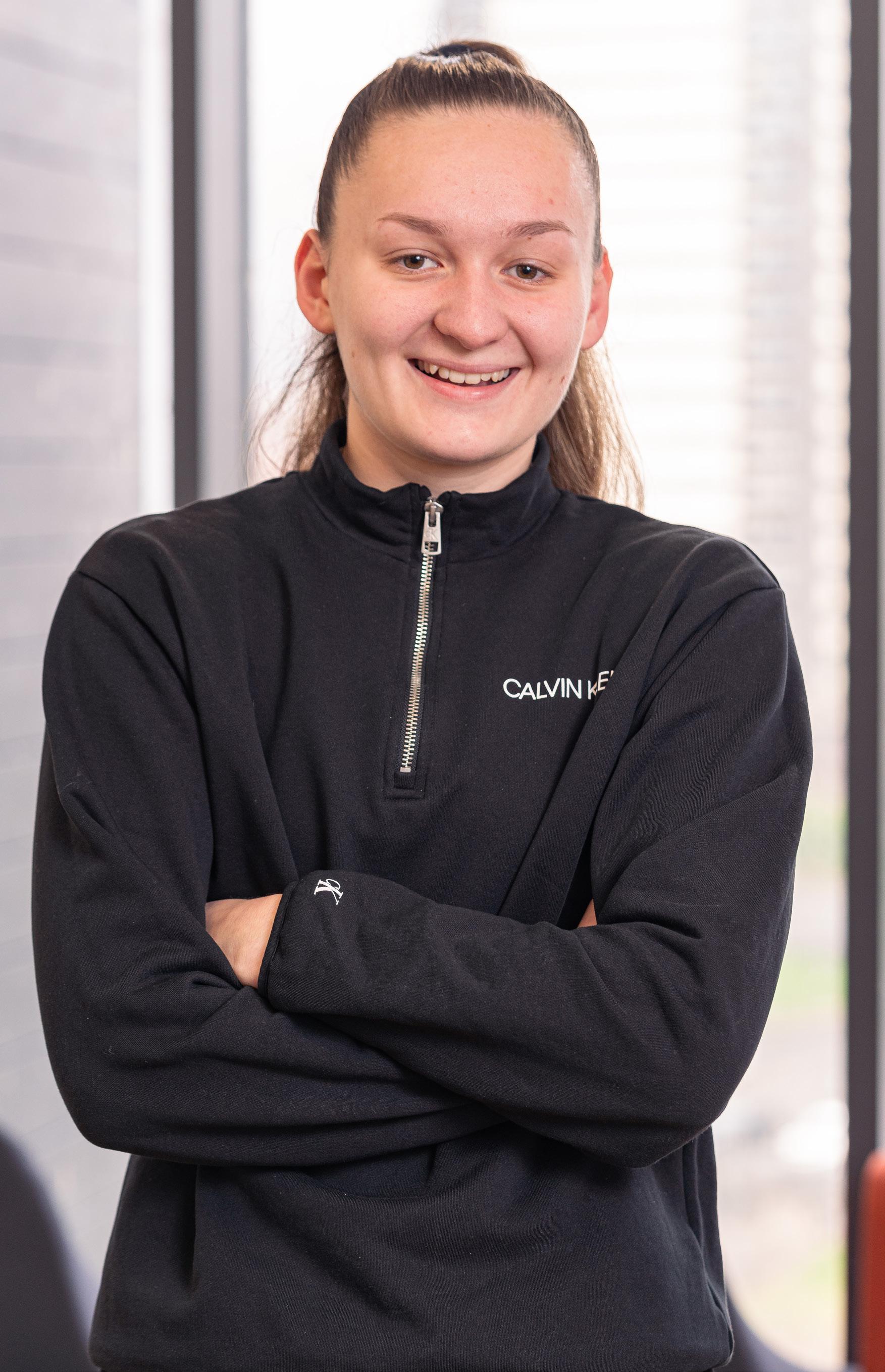
COURSES:
HOLY FAMILY RC AND CE COLLEGE
RESULTS:
DESTINATION:
University of SalfordPhysiotherapy
JAMIE PAKES NEWHOUSE ACADEMY
COURSES:
DESTINATION: The University of WarwickFilm and Literature
SUBJECTS ECONOMICS A level
WHAT IS ECONOMICS?
There are two broad areas within Economics: Firstly, Microeconomics looks at the choices and behaviour of different economic agents such as consumers and firms and how they respond to incentives, including ways in which governments can alter those incentives to change behaviour.
Secondly, Macroeconomics looks at many of the big issues that dominate news coverage of economics such as the threat of recession and rising unemployment, the drive for greater economic growth, or the impact of the rising cost of living.
WHY STUDY THIS SUBJECT?
In addition to providing the knowledge to help you understand a complicated world, this subject enables you to develop a wide range of skills highly sought after by universities and employers. These include the interpretation and analysis of data, building logical chains of reasoning and developing sound judgement based on available evidence.
WHO IS THE SUBJECT SUITABLE FOR?
If you take an interest in current affairs, you will find Economics challenges your pre-conceptions and encourages you to appreciate differing points of view in light of concrete evidence.
WHAT CAN YOU EXPECT FROM ECONOMICS?
Economics offers you the opportunity to try to make sense of the factors that shape many aspects of our daily lives, from the price of the goods we buy, the taxes we pay, and the jobs that we do, to trends in globalisation and international trade. We’ll look at the ideas of great thinkers (both historic and contemporary) and seek to apply them to real events from the past, present and future.
WHAT CAN I DO WITH A
QUALIFICATION IN ECONOMICS?
Successful students would be welcomed onto a wide range of degree courses, in both Economics itself and related subject areas, such as Accountancy and Finance, or Business and Politics. Studies consistently show that Economics graduates are among the highest paid. Career options are varied and include the civil service, banking and finance, marketing, business management and education.
HOW IS THE SUBJECT ASSESSED?
You will complete three examinations at the end of the two-year course, including multiple choice, data response and essay questions.
100% Examination
KEY TOPICS
YEAR 1
• Supply, demand and markets
• Market failure and government intervention
• Measuring economic performance - inflation, unemployment, etc
• Government economic policy
ENTRY REQUIREMENTS
YEAR 2
• Theory of the firm and market structures
• Labour markets
• Poverty and inequality
• Banking and the financial system
• Exchange rates and international trade
College entry requirements apply as detailed on page 29. In addition, a grade 5 or above is required in GCSE Mathematics and a grade 4 or above in GCSE English Language.
Economics helps you to approach real-life issues logically and with an open mind. You get to find out things about the way the world works that you would not otherwise learn.
 Joe Gibbons
Joe Gibbons
ECONOMICS
ENGLISH LANGUAGE A level
WHAT IS ENGLISH LANGUAGE?
English Language is the study of English in its widest sense, from the first words a baby speaks to the most subtle and manipulative advertisements or political speeches. We look at the ways in which writers and speakers change and adapt their language in order to get the reactions that they want from their audience. Language is powerful; it can reveal your gender, your social class, your ethnicity and even your occupation and affect the way others perceive you. Examining the way people interact can tell you much more than you might think.
WHY STUDY THIS SUBJECT?
Study English Language to sharpen your analytical and interpretive abilities, and to develop your research skills; you will also improve the quality of your own written and spoken language for a wide range of careers and opportunities.
WHO IS THE SUBJECT SUITABLE FOR?
Anybody interested in a degree or career based in communications or the media, including law, public relations, journalism, publishing, script writing or teaching. English Language is also highly valued by universities for students studying Mathematics, Science, Medicine or Technology and equally for the humanities such as History, Philosophy or Geography.
KEY TOPICS
YEAR 1
• Textual analysis: How do the choices that speakers and writers make affect the way we react to them and their ideas?
• Discourse analysis: What does the way in which we speak to and react to other people reveal about our feelings about them and what they have to say?
• Language varieties: How does who we are, our gender, class, ethnicity, religion and nationality affect the language we use and how does it affect the views others hold about us?
• Creative writing: You will have the chance to produce a piece of writing on a topic of your choice that will count towards your final exam grade.
WHAT CAN YOU EXPECT FROM ENGLISH LANGUAGE?
A great deal of the subject involves analysing language from an incredibly wide range of sources, from London street-gang members to the King; advertisements and social media; formal speeches and jokes; babies and the elderly, to see how they affect their audience and affect the way we see the person producing them. You will be expected to offer your own analyses and interpretations and to be able to make use of the same techniques. We will also spend time looking at the latest theories about, and research into, language issues.
WHAT CAN I DO WITH A QUALIFICATION IN ENGLISH LANGUAGE?
Most of our students progress to university across a very wide range of degree courses, including English, Linguistics, Speech and Language Therapy, and Journalism, but a great many find that English supports their studies in Medicine, Law, History, Science and Humanities. Others progress into work in fields such as journalism and public relations or onto apprenticeships in fields such as law and the media.
HOW IS THE SUBJECT ASSESSED?
You will complete a coursework project of around 3000 words and two examinations at the end of the two-year course.
YEAR 2
• Language change: What has happened to English in the 1600 years for which it has existed and why did it happen?
• Child language development: How do babies go from gurgles to words, sentences to conversations and then move on to reading and writing?
• Language issues: What do people say and think about the language of the young, of slang, of accents? How do such things affect the way we see the people who use them, and is this effect accurate or fair?
ENTRY REQUIREMENTS
College entry requirements apply as detailed on page 29. In addition, a grade 5 or above is required in GCSE English Language.
Studying A level English Language has allowed me to develop my analytical skills and gain a broader knowledge of various theories and linguists. Every topic in this course is so intriguing and truly insightful.
 Valerie Agbeja
Valerie Agbeja
ENGLISH LANGUAGE
ENGLISH LITERATURE A level
WHAT IS ENGLISH LITERATURE?
English Literature is the study of the ways in which some of our greatest writers explore the issues that make the world what it is and us who we are. Through literature, we explore the lives of the marginalised and the obscure, and hear voices that need to be heard.
WHY STUDY THIS SUBJECT?
You will develop your skills of interpretation and analysis to an advanced level so that you are able to formulate and express your views and arguments in an effective, authoritative manner. English Literature is an interesting and informative course that will enable you to develop a wide range of transferable skills that are essential for progression to higher education and employment.
WHO IS THE SUBJECT SUITABLE FOR?
If you love to read and talk about books, this is the subject for you.
WHAT CAN YOU EXPECT FROM ENGLISH LITERATURE?
You can expect English Literature lessons to be lively, thought-provoking and, at times, contentious! You are encouraged to offer your opinions and justify and argue their interpretations with evidence and sound reasoning. You will study a range of novels, plays, poems and other literary forms, exploring the concerns of the people who wrote them, the methods that they use to shape the responses of their readers and the conclusions that we can draw from our reading of them.
KEY TOPICS
YEAR 1
• Frankenstein
Never Let Me Go
• The poetry of Philip Larkin
• Marlowe’s Doctor Faustus
ENTRY REQUIREMENTS
WHAT CAN I DO WITH A QUALIFICATION IN ENGLISH LITERATURE?
English Literature is highly regarded by universities and employers alike and will support your progression to a range of courses and careers. It not only supports those who want to study more obvious subjects such as English, Journalism, Teaching or Creative Writing, but is a massive advantage for a very wide range of demanding degree courses such as Law, Science, Medicine, foreign languages, and many others.
HOW IS THE SUBJECT ASSESSED?
80% of your marks will be from examinations and 20% from coursework.
YEAR 2
• A collection of unseen poems, and poems from Poetry of the Decade
• Shakespeare’s Hamlet
• The Great Gatsby (and a text of your choosing) for the coursework unit which includes Americanah, Fight Club and The Color Purple,
College entry requirements apply as detailed on page 29. In addition, a grade 5 or above is required in GCSE English Language and a grade 4 or above in GCSE English Literature.
English Literature is full of critical analysis that will transfer into the world of work. In lessons, you are mostly working in teams, so support is given to you every step of the way by your peers and by your teachers.
 Grace Lee
Grace Lee
ENGLISH LITERATURE
SUBJECTS FILM STUDIES A level
WHAT IS FILM STUDIES?
Film Studies is the study of film as an art form, learning to appreciate the medium not only through its technical production, but also by understanding the wider meanings and messages.
WHY STUDY THIS SUBJECT?
Film Studies is an exciting subject that will allow you to study a range of films and gain an insight into the wider industry. You will study the language of film, performance, cinematography, editing and sound, and see how they construct meaning and provoke audience response. You will engage in debates around technology and the issues facing independent cinema. Working with industry-leading equipment and editing packages will provide practical experience, allowing you to create a professional portfolio of work to carry forward to university or employment.
WHO IS THE SUBJECT SUITABLE FOR?
If you have a willingness to learn, an interest in the development and production of films and are passionate about developing your knowledge of the film industry, this subject is for you.
WHAT CAN YOU EXPECT FROM FILM STUDIES?
Film Studies offers a lively and challenging insight into the film industry and film as an art form. You will be expected to participate in debates and be open to exploring both independent and international cinema. You are expected to analyse key texts and then write about them in your exam. You will also be required to demonstrate creativity with your practical productions.
WHAT CAN I DO WITH A QUALIFICATION IN FILM STUDIES?
You will develop a vast range of technical, creative and analytical skills throughout your study. These skills are highly desirable, making you a perfect candidate for a wide range of university degrees, as well as preparing you for a career in areas such as film production, directing, journalism and screenplay writing.
HOW IS THE SUBJECT ASSESSED?
This subject is assessed through a combination of coursework and two external examinations.
KEY TOPICS
YEAR 1
During the first year you will study four exciting units including producing a short or screenplay and storyboard :
Component 2 - Section A:
Global cinema - City of God & Mustang
Component 1 - Section A:
Hollywood 1930-1990
- Casablanca & Bonnie and Clyde
Component 1 - Section C:
British cinema since 1995
- Trainspotting & Shaun of the Dead
Component 2 - Section C:
Silent cinema - Sunrise
ENTRY REQUIREMENTS
YEAR 2
During the second year you will engage with some diverse American and British cinema :
Component 1 - Section B:
American Film since 2005
- Joker & Captain Fantastic
Component 2 - Section B:
Documentary - Amy
Component 2 - Section C:
Experimental film - Memento
College entry requirements apply as detailed on page 29. In addition a grade 4 or above is required in GCSE English Language.
The Film Studies course has completely changed my perspective as a viewer and has developed my editing skills. I have studied a broad range of film types which has made me appreciate how much goes into the film-making process globally.
 Maebh Logue
Maebh Logue
FILM STUDIES
COURSES:
DESTINATION:
The University of ManchesterComputer Science

NIAMH POOLE WHITWORTH COMMUNITY HIGH SCHOOL
COURSES:
Health & Social Care
Psychology
RESULTS:
D*D B
DESTINATION:
University of ChesterPrimary Education with QTS
SUBJECTS FRENCH A level
WHAT IS FRENCH?
French is undoubtedly one of the major world languages, with more than 300 million people speaking it across five continents. Not only does learning another language enrich the mind, but it also opens new horizons, both personal and professional. Research has shown that people who are able to speak more than one language significantly increase their employability and earning potential, and this is certainly the case for French with its influence on domains such as cooking, fashion, theatre, the visual arts and architecture, to name but a few.
WHY STUDY THIS SUBJECT?
Studying a foreign language teaches you all the skills that employers want in their employees: an analytical mind, good thought processes, cultural and intercultural awareness, good communication, and the ability to be a good team player. Speaking French might increase your salary by as much as 20% and it will give you a head start on any other potential employees.
WHAT CAN I DO WITH A QUALIFICATION IN FRENCH?
There will be a range of opportunities where you can continue to use and further develop your language skills and knowledge of contemporary society. If you are interested in career paths such as business, diplomacy and foreign relations, travel and tourism, translation and journalism, then French is a great option for you!
KEY TOPICS
YEAR 1
You will build on previous knowledge from GCSE French through the topics of:
• Family and how it has evolved in recent years in the French-speaking world
• Cyber society
• Volunteering
• French/French-speaking heritage and how it is celebrated
• French/French-speaking music
• French/French-speaking cinema
• You will also study a French film: ‘Au revoir les enfants’
WHO IS THE SUBJECT SUITABLE FOR?
If you are interested in languages and communication, and you enjoy learning about other cultures, then our French course is for you. Learning a language at a high level, such as A level, will open many doors in terms of higher education and job opportunities, as well as allowing you to travel all over the world as French is spoken on five continents. Currently, fewer and fewer students your age are studying languages, and by taking French A level you will be placing yourself in an elite group of people whose linguistic skills will no doubt be highly sought after later in life.
WHAT CAN YOU EXPECT FROM FRENCH?
By studying French at A level, you will develop your language skills greatly and become fluent in the language through studying grammar and how the language works, as well as gaining exposure to many varied sources and authentic materials such as newspaper articles, videos, literary extracts, etc. You will also discover much more about French-speaking culture, which will help you gain a better understanding of the globalised world we live in.
HOW IS THE SUBJECT ASSESSED?
Paper 1 : Listening, reading and writing (50% of the A level qualification)
Paper 2 : Written response to film and text (20% of the A level qualification)
Paper 3 : Speaking — individual research project and discussion (30% of the A level qualification)
YEAR 2
50% Listening, Reading, Writing
20% Written Response
30% Speaking
You will develop critical skills and express your personal opinions through the topics of:
• The diversity of French-speaking societies
• The life of marginalised people in the French-speaking world
• How criminals are treated in the French-speaking world
• The political engagement of the French-speaking youth
• Demonstrations and strikes in the French-speaking world
• Politics and immigration
• You will also study a French novel: ‘No et moi’
ENTRY REQUIREMENTS
College entry requirements apply as detailed on page 29. In addition, a grade 5 or above is required in GCSE French.
By studying French I have been able to expand my vocabulary and refine my grammar. It’s enriched my debating, critical thinking and cultural awareness. A level French has boosted my confidence and will aid me at university.
 Josias Kiasuka
Josias Kiasuka
FRENCH
SUBJECTS FURTHER MATHEMATICS A level
WHAT IS FURTHER MATHEMATICS?
Further Mathematics both broadens and deepens the material covered in A level Mathematics. It allows you to study a wider variety of mathematics beyond the A level Mathematics syllabus, including mathematics with real-life applications in the growing world of artificial intelligence and logistics.
WHY STUDY THIS SUBJECT?
An A level in Further Mathematics shows an excellent logical mind, reasoning ability and competence in all things numerate. This subject MUST be taken in combination with A level Mathematics. If you loved Mathematics at high school, enjoy working hard and like to solve puzzles with exact methods and answers, then Mathematics and Further Mathematics offer the opportunity to continue improving your numerical skills and learn a great deal beyond your GCSE course.
WHO IS THE SUBJECT SUITABLE FOR?
If you enjoy learning about mathematical concepts and new methods of problem solving, you are doing well in Mathematics at high school and are enjoying the challenge of ensuring you get the best grades, then this is the subject for you.
Options for studying Further Mathematics
WHAT CAN YOU EXPECT FROM FURTHER MATHEMATICS?
As well as building on topics you are studying in A level Mathematics, there are more branches to explore such as complex numbers, polar coordinates, Hyperbolic functions and many more fascinating topics. As well as the additional pure topics, there are new areas of mechanics and decision mathematics. These include collisions, Dijkstra’s algorithm and linear programming.
WHAT CAN I DO WITH A QUALIFICATION IN FURTHER MATHEMATICS?
A level Further Mathematics supports many career pathways - especially those linked to numerical analysis such as careers in mathematics, physics, engineering, data analysis and computer programming to name but a few. It is highly regarded by employers and universities; it shows a fantastic level of mathematical ability, problem-solving skills and logical thought processes. All these lead to you developing your analytical skills, required for most careers.
HOW IS THE SUBJECT ASSESSED?
Further Mathematics is assessed through four examinations at the end of your second year. Two of the exams are in core pure mathematics, one in mechanics and one in decision mathematics, each worth 75 marks and one quarter of your final grade.
100% Examination
Further Mathematics can be chosen as a full A level as part of a normal three A level programme. In addition, if you wish to study a three A level programme including Mathematics but not Further Mathematics, Further Mathematics could be considered for study as an AS level in the first year, only through the School of Maths programme. On the AS level, you will study a selection of the topics from all the modules listed below.
KEY TOPICS
YEAR 1
Core pure mathematics including:
• Complex numbers
• Matrices
• Proof by induction
• Summations
• Vectors
Decision mathematics including:
• Floyd’s algorithm
• Graph theory
• Dijkstra’s algorithm
• Linear programming
ENTRY REQUIREMENTS
YEAR 2
Core pure mathematics including:
• Hyperbolic function
• Polar coordinates
• Further calculus
• Second order differential equations
Mechanics including:
• Work, energy and power
• Strings and springs
• Collisions
• Restitution
College entry requirements apply as detailed on page 29. In addition, a grade 7 or above is required in GCSE Mathematics. You MUST also study A level Mathematics.
Studying Further Mathematics will provide opportunities for me to research applications of Mathematics in the real-world. The teachers have helped me expand my knowledge and developed my problem-solving to a higher level.
Max Tonge Booth
FURTHER MATHEMATICS
SUBJECTS GEOGRAPHY A level
WHAT IS GEOGRAPHY?
Geography involves the study of people, places and the interactions that take place between and within them in a range of environments and at a range of scales.
WHY STUDY THIS SUBJECT?
By studying Geography you will develop a genuine in-depth understanding of the world we live in today and the key global, national and local issues affecting our society. Geography is also a subject that develops a wide range of analytical skills that are highly sought after by employers. With the growing importance of issues such as climate change, migration, environmental degradation and inequality, Geography is one of the most relevant courses you could choose to study.
WHO IS THE SUBJECT SUITABLE FOR?
Geography complements all subjects because of the wide range of topics and skills that are developed through the two-year course. If you have genuine curiosity about the world we live in, then Geography is for you!
WHAT CAN YOU EXPECT FROM GEOGRAPHY?
You will develop an in-depth understanding of classic physical geography topics such as tectonics and coasts; and human geography topics including globalisation, regeneration and migration. Contemporary critical issues are explored in the subject including water scarcity, the nature of energy security, the role of superpowers and issues associated with globallyinterconnected societies. A minimum of four days of field work will be completed by all students; this is also when data is collected for your independent investigation coursework.
WHAT CAN I DO WITH A QUALIFICATION IN GEOGRAPHY?
The subject directly lends itself to a range of university courses across the environmental, social and political spectrum, while also being a highly sought-after qualification in itself by employers due to the interdisciplinary nature of the subject.
HOW IS THE SUBJECT ASSESSED?
Written examinations account for 80% of the overall grade, with coursework accounting for the remaining 20%.
KEY TOPICS
YEAR 1
• Tectonic processes and hazards
• Coastal landscapes and change
• Globalisation
YEAR 2
• Water cycle and water insecurity
• Carbon cycle and energy security
• Superpowers
• Migration, identity, and sovereignty
ENTRY REQUIREMENTS
College entry requirements apply as detailed on page 29.
Studying Geography has been an eye-opening experience. It has deepened my understanding of the world and its complexities. The lesson are engaging and the field trips have been really enjoyable.
 Millie Riches-Woolston
Millie Riches-Woolston
GEOGRAPHY
SUBJECTS HEALTH & SOCIAL CARE BTEC DIPLOMA
WHAT IS HEALTH & SOCIAL CARE (BTEC)?
Health & Social Care is a term that relates to services that are available from health and social care providers. This subject focuses on understanding the human body, psychological theories on human development, promoting public health and meeting individual care and support needs.
WHY STUDY THIS SUBJECT?
This course will develop your understanding of the way you can change people’s lives as well as allowing you to progress to further study or employment within a variety of care settings. It will allow you to pursue a career in healthcare, which focuses on helping people who are having problems with their physical or mental health; or in social care where you can help the most vulnerable people in your community.
WHO IS THE SUBJECT SUITABLE FOR?
If you are interested in developing your understanding of caring roles within society and would like to progress into a caring career, then this is the subject for you.
WHAT CAN YOU EXPECT FROM HEALTH & SOCIAL CARE (BTEC)?
You will be able to explore a diverse range of topics with real-life applications. You will gain skills and knowledge on how we develop, what illnesses and diseases can affect us, and how we support those with caring needs. Through engaging class activities, in-depth class discussions and research tasks we will help you develop a deep understanding of the broad range of topics.
WHAT CAN I DO WITH A QUALIFICATION IN HEALTH & SOCIAL CARE (BTEC)?
Health & Social Care (BTEC) will support your progression to a range of higher education courses including Nursing, Social Work, Occupational Therapy and Primary Education, among many others. The qualification and skills you develop will also support your progression into employment.
HOW IS THE SUBJECT ASSESSED?
Assessment is through five pieces of coursework, two external examinations and one controlled assessment over the two-year course.
KEY TOPICS
YEAR 1
• Human lifespan development (Exam unit)
• Working in health and social care (Exam unit)
• Meeting individual care and support needs (Coursework)
• Physiological disorders (Coursework)
YEAR 2
• Promoting public health (Coursework)
• Principles of safe practice in health and social care (Coursework)
• Enquiries into current research in health and social care (Controlled assessment)
• Psychological perspectives (Coursework)
ENTRY REQUIREMENTS
College entry requirements apply as detailed on page 29.
I have thoroughly enjoyed studying Health & Social Care. This course has developed my research and written skills with the assignmentbased work and has prepared me for a Nursing course at university by developing my communication and time management skills.
 Seyda Yilmaz
Seyda Yilmaz
HEALTH & SOCIAL CARE BTEC
SUCCESS
RAMILA IRFAN MATTHEW MOSS HIGH SCHOOL
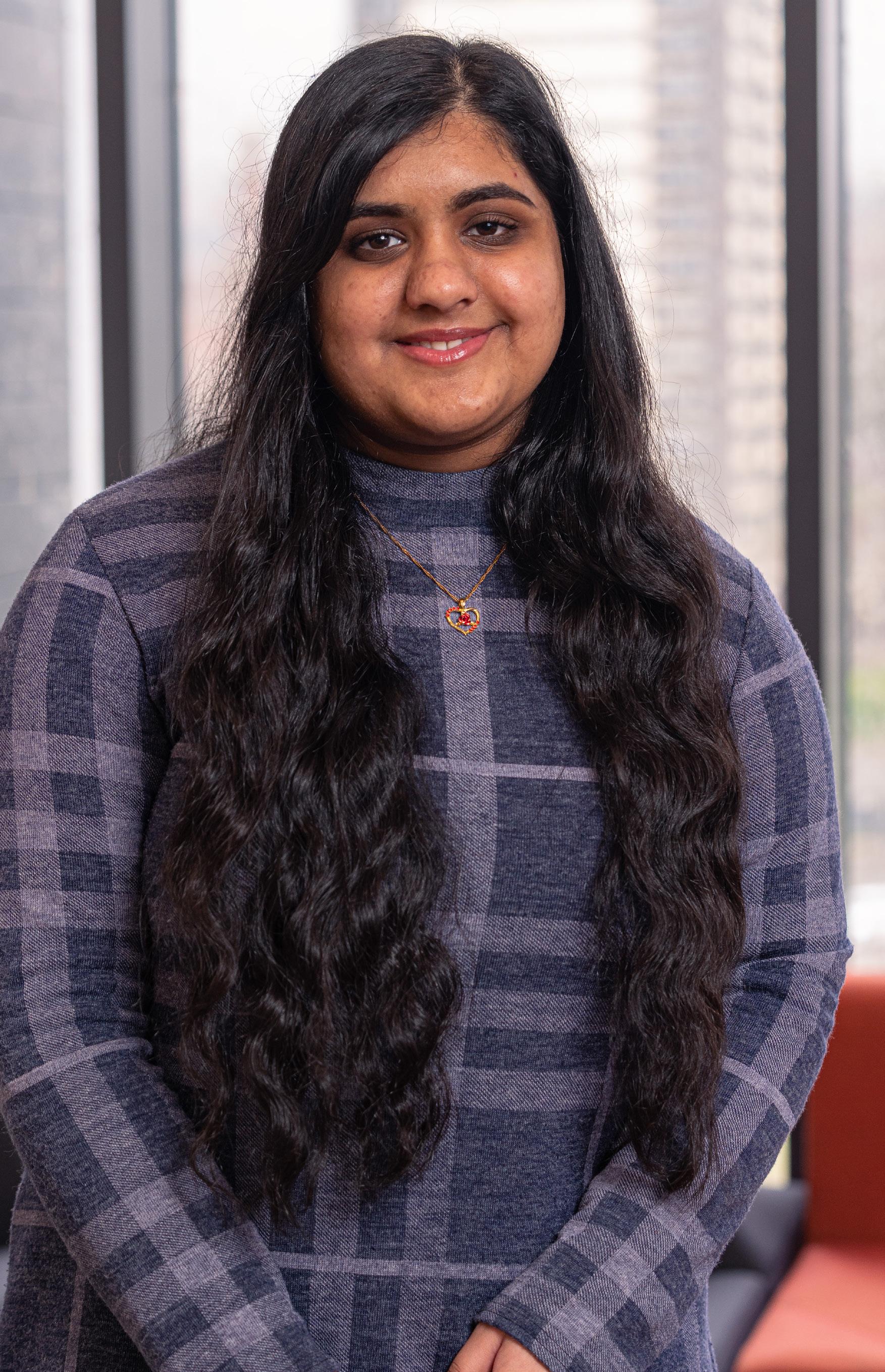
COURSES:
RESULTS:
DESTINATION: Manchester Metropolitan UniversityForensic Psychology
RYAN MURRAY WARDLE ACADEMY
COURSES:
RESULTS:
A A B
DESTINATION:
KPMGDegree Apprenticeship in Auditing
SUBJECTS HISTORY A level
WHAT IS HISTORY?
History is the study of the past and has always been about change. Historians examine political, economic, social and cultural issues. It is an academic subject that makes you question why things happened, the consequences, and the way people viewed them.
WHY STUDY THIS SUBJECT?
History is a traditional academic subject that is highly regarded by universities. Top universities recommend History at A level as a way to access a wide variety of more specialist courses as well as valuing it as a subject in its own right.
WHAT CAN I DO WITH A QUALIFICATION IN HISTORY?
History is a subject that provides suitable preparation for higher education. As a traditional academic course, History is well regarded by universities and supports an application for many courses, notably English, History, Law, Modern Languages and Politics.
KEY TOPICS
The Age of the Crusades, 1071-1204
What motivated both Christians and Muslims to wage ‘holy war’? Investigate the four crusades and participants including the zealous Christian Templars, the mysterious Muslim Assassins, as well as the Byzantine remnants of the Roman Empire. The age of the crusades witnessed a staggering clash of cultures and societies where greed and the pursuit of power clashed with sincere religious beliefs on an international stage.
The Wars of the Roses, 1450-1499
Fifteenth-century England witnessed the destruction of the dynasty that had ruled for over three hundred years. The Plantagenets were a family divided between the house of Lancaster and the house of York. From the ‘madness’ of Henry VI, through to the glamour of Edward IV’s court, and the controversial rule of Richard III, one of the most vilified kings in English history, the houses fought for control of England and the support of ‘over mighty’ nobles. Study the real-life game of thrones and the ascent of the Tudors to power.
WHO IS THE SUBJECT SUITABLE FOR?
If you are interested in studying past events and analysing the causes and impact of historical events, A level History is the course for you.
WHAT CAN YOU EXPECT FROM HISTORY?
Debating and discussing historical issues is central to the study of this course. You should expect to be able to use the knowledge that you gain to make arguments as to the causes, consequences and significance of the key events studied. The periods of history studied embrace a range of religious, cultural and political perspectives so an open-minded ability to listen to alternative viewpoints and have a respect for them is essential. Some of the cultural norms studied differ from modern societies so there is a need for an appreciation of how people in the past saw the world around them.
HOW IS THE SUBJECT ASSESSED?
Assessment is through two examinations and coursework, with 20% of your total marks coming from the coursework.
American Military Interventions, 1798-2003 (Coursework) The nineteenth and twentieth centuries saw the rise of the United States to the ranks of global superpower. Choose a hundred-year period within this timescale and investigate the reasons for American intervention in the affairs of others through conflicts such as the world wars, Korea and Vietnam as well as more recent conflicts such as Kosovo, Afghanistan and Iraq.
ENTRY REQUIREMENTS
College entry requirements apply as detailed on page 29. In addition, a grade 4 or above is required in GCSE English Language.
I have found studying History an incredibly enjoyable journey. The constant support from teachers, who motivate and push you to excel, has been so valuable. I am looking forward to being able to use my knowledge and skills further while studying at university.
Victoria Epia

SUBJECTS INFORMATION TECHNOLOGY
BTEC DIPLOMA
WHAT IS INFORMATION TECHNOLOGY (BTEC)?
Information Technology (BTEC) is the study of how technology can be used to process, present and analyse data. You will develop an understanding of how different hardware and software can be used to provide solutions to everyday issues.
WHY STUDY THIS SUBJECT?
You will develop a vast range of skills to prepare you for further study and employment, whether that be in an information technology related field or otherwise. You will learn to use a range of software packages to solve common issues and develop an understanding of how information technology can be used within wider society.
WHO IS THE SUBJECT SUITABLE FOR?
If you are interested in developing skills in information technology and enjoy applying your learning to different scenarios, Information Technology (BTEC) is the subject for you.
WHAT CAN YOU EXPECT FROM INFORMATION TECHNOLOGY (BTEC)?
You will develop skills through utilising a range of software and making use of information technology systems to solve problems, as well as a variety of employability skills required to solve problems and come up with solutions to real-life business scenarios.
KEY TOPICS
YEAR 1
• Unit 1: IT systems (Exam unit)
• Unit 2: Systems to manage information (Controlled assessment)
• Unit 3: Using social media in business (Coursework)
• Unit 5: Data modelling (Coursework)
WHAT CAN I DO WITH A QUALIFICATION IN INFORMATION TECHNOLOGY (BTEC)?
A qualification in Information Technology (BTEC) will allow you to develop a range of transferable skills that will support your progression into higher education and employment. Information Technology (BTEC) can lead to further study and employment in areas such as games design, software development or businessrelated courses, among many others. The skills you develop on this course will support your progression to a variety of courses and employment.
HOW IS THE SUBJECT ASSESSED?
Assessment is through five pieces of coursework, two external examinations and one controlled assessment over the two-year course.
52%
16%
YEAR 2
• Unit 4: Programming (Coursework)
• Unit 9: IT project management (Coursework)
• Unit 11: Cybersecurity and incident management (Controlled assessment)
• Unit 6: Software testing (Coursework)
ENTRY REQUIREMENTS
Studying IT has been a great experience because while I have been developing and learning new skills, I’ve also had lots of fun. The coursework gives you freedom allowing you to design and create your projects however you want. This subject has a lot of depth, enhances your skills and knowledge, and prepares you for your next steps.
Iftikhar KhondakerINFORMATION TECHNOLOGY BTEC
SUBJECTS LAW A level
WHAT IS LAW?
The study of Law analyses the rules and principles that govern our lives. You will look at book, criminal and civil law, how our legal system operates as well as evaluating different areas of law.
WHY STUDY THIS SUBJECT?
Law is a ‘live’ subject and impacts us every day. Not only do you learn about your rights, you will also look at how the law settles disputes in both criminal and civil law. If you have an interest in a legal or professional career, then you will enjoy Law.
WHO IS THE SUBJECT SUITABLE FOR?
A level Law is suited to students who are excited and eager to study new content, enjoy debate and discussion, look at how our society is being shaped by the laws around us and have an interest in current affairs. You will cover a lot of content and the subject will challenge you academically, but you will receive an excellent grounding in key legal areas such as criminal, contract and tort law. This will better prepare you for progression to university study or a potential legal or professional career. If you like a new challenge and are not afraid of hard work, then this is an ideal course for you!
WHAT CAN YOU EXPECT FROM LAW?
As with all A levels, you must be dedicated to be successful. On this course, you will learn to think like a lawyer. You should expect fast-paced lessons that cover vast content with many new and exciting legal principles. You must also be prepared to engage with the skills needed for the exam, as it is vital that you have the ability to apply your legal knowledge to factual scenarios and evaluate questions set — just like a lawyer would. These are essential skills if you are considering a degree in Law.
WHAT CAN I DO WITH A QUALIFICATION IN LAW?
A level Law puts you in an excellent position to start your journey of becoming a solicitor, a barrister or another legal professional. Even if you don’t want to study Law in higher education, the skills you develop on the course, like problemsolving and critical-thinking, are sought after by higher education institutions and employers. The range of careers is vast, but some examples include working for the police, the home office, and other governmental institutions like the armed forces.
HOW IS THE SUBJECT ASSESSED?
There are three exams in Law. All exams are equally weighted.
KEY TOPICS
YEAR 1
You will learn all about our legal system and how it functions, as well as how to become a solicitor or barrister, which is ideal for those interested in a legal career. You will also cover a mix of both civil and criminal law which will lead to a range of interesting topics and legal problems. From murder, burglary and GBH to general defences such as Insanity and Intoxication.
YEAR 2
The focus will be on civil law (contract and tort), looking at some of the most common and popular legal areas that are practised by solicitors today. You will learn all about your consumer rights against businesses and areas such as negligence. In addition, you will also study the Nature of Law and look at issues such as whether we have a legal system that is based on ‘justice’ and whether the law is morally correct. You will look at wider legal issues and develop your evaluative skills.
ENTRY REQUIREMENTS
College entry requirements apply as detailed on page 29. In addition, a grade 4 or above is required in GCSE English Language.
What I love about A level Law is that the lessons are entertaining and dynamic but also challenging at times. The staff are supportive and they’ve taught me skills that are transferable from the classroom to other areas of life!
 Carliece Heenan
Carliece Heenan
SUBJECTS MATHEMATICS A level
WHAT IS MATHEMATICS?
Mathematics explores areas of pure mathematics such as geometry, algebra and trigonometry. It also deepens your knowledge of statistics and probability, considering the application of these in real-life, including learning how to use and analyse a real-world large data set. Mechanics is a new topic to most students; this is the study of how things move and interact with each other.
WHY STUDY THIS SUBJECT?
Employers in all sectors highly value a candidate who can offer mathematical ability. Research has shown those with A level Mathematics, on average, have higher salaries than those without! Mathematics demonstrates you are logical, can reason, have a high level of numeracy, and serves to support many other courses. This offers the opportunity to continue improving your numerical skills and learn a great deal beyond your GCSE course.
WHO IS THE SUBJECT SUITABLE FOR?
If you enjoy learning about mathematical concepts and new methods of problem-solving and have a strong mathematical ability, then A level Mathematics is for you! Mathematics is for anyone who is keen to keep up their strong numeracy and algebra skills and is a good combination with any other subjects.
KEY TOPICS
YEAR 1
Pure Mathematics including:
• Trigonometry
• Calculus
• Vectors
• Logarithms
Statistics including:
• Probability
• Numerical measures
• The binomial distribution
Mechanics including:
• Constant acceleration
• Forces
• Units and vectors
ENTRY REQUIREMENTS
WHAT CAN YOU EXPECT FROM MATHEMATICS?
As well as building on topics you have studied at school, there are new branches of mathematics to explore, including calculus - differentiation and integration, exponentials and logarithms, and vectors. As well as these pure topics, the applied section, including statistics and mechanics, is new to most students; taught from real-life examples and interpreted back into the real-world; you will develop your analytical and problem-solving skills.
WHAT CAN I DO WITH A QUALIFICATION IN MATHEMATICS?
A level Mathematics supports almost all career pathways - from careers in medicine or engineering, to data analysis, economics, computer programming, sciences, and business to name but a few. It is highly regarded by employers and universities and is a sought after qualification.
HOW IS THE SUBJECT ASSESSED?
There are three exams at the end of the second year of study. Two of these are on pure mathematics, worth 100 marks each. The third consists of two sections, one statistics and one mechanics; these are worth 50 marks each.
YEAR 2
Pure Mathematics including:
• Differential equations
• Sequences
• Numerical methods
• Further calculus
Statistics including:
• The normal distribution
• Correlation and regression
100% Examination
• Approximations and hypothesis testing
Mechanics including:
• Variable acceleration
• Moments
• Projectiles
College entry requirements apply as detailed on page 29. In addition, a grade 6 or above is required in GCSE Mathematics.
Mathematics is not just about numbers, equations and algorithms; it is about understanding and problem solving. I enjoy the challenges my teachers provide and support me through, and the element of surprise on each new topic.
 Rouhma Sajjaf
Rouhma Sajjaf
MATHEMATICS
SUBJECTS MEDIA STUDIES A level
WHAT IS MEDIA STUDIES?
Media Studies is a vast and diverse subject, which includes studying media processes ranging from historical sectors to the ultra-contemporary subsectors. A level Media Studies will introduce you to many different media outlets and encourages theoretical considerations across all platforms studied. Audience reception, representation, regulation and ownership, and gender theory are just some of the issues you will learn about.
WHY STUDY THIS SUBJECT?
Media is at the forefront of our social and cultural existence and is the digital platform that consumes, shapes and evolves our own personal identities. Studying this A level allows you to delve into subject areas that relate to your personal tastes, choices and lifestyle.
WHO IS THE SUBJECT SUITABLE FOR?
Media Studies is suitable for a wide range of students. You will be expected to think independently and to develop your own voice and will be encouraged to expand your knowledge outside of the classroom through reading and engaging with a wide range of media texts.
WHAT CAN YOU EXPECT FROM MEDIA STUDIES?
A level Media Studies allows you to question the validity of the information you receive on a daily basis and to be aware of bias within the media, so that by the end of the two-year course you should have an even better understanding of the world we live in. As well as studying existing media, you will have the opportunity to consolidate your learning by creating your own cross-media project. This will help you to develop expertise in professional-standard software, such as Adobe Photoshop.
WHAT CAN I DO WITH A QUALIFICATION IN MEDIA STUDIES?
Media Studies students typically enter careers in the media and cultural and creative industries. Areas of work include television and radio, film and video, digital media, computer games, journalism, writing and publishing, PR and media practice.
HOW IS THE SUBJECT ASSESSED?
This subject is assessed through a combination of coursework and two external examinations.
70% Examination
30% Coursework
KEY TOPICS
YEAR 1
Component One:
• Section A: Analysing media language
– Advertising
– Marketing
– Music videos
– Newspapers
• Section B: Understanding media industries and audiences
– Television
– Radio
– Newspapers
– Films
– Video games
ENTRY REQUIREMENTS
YEAR 2
Component Two:
• Section A: Television in the global age
• Section B: Magazines - mainstream and alternative media
• Section C: Media in the online age
College entry requirements apply as detailed on page 29.
Media Studies is an exciting subject as it allows me to reflect on how much of an impact media has on my daily routine. This subject has allowed me to study areas of the media I would not have considered before, such as radio, marketing and video games.
 Claudie Nicholson
Claudie Nicholson
MEDIA STUDIES
COURSES:
DESTINATION:
Queen Mary University of LondonNeuroscience
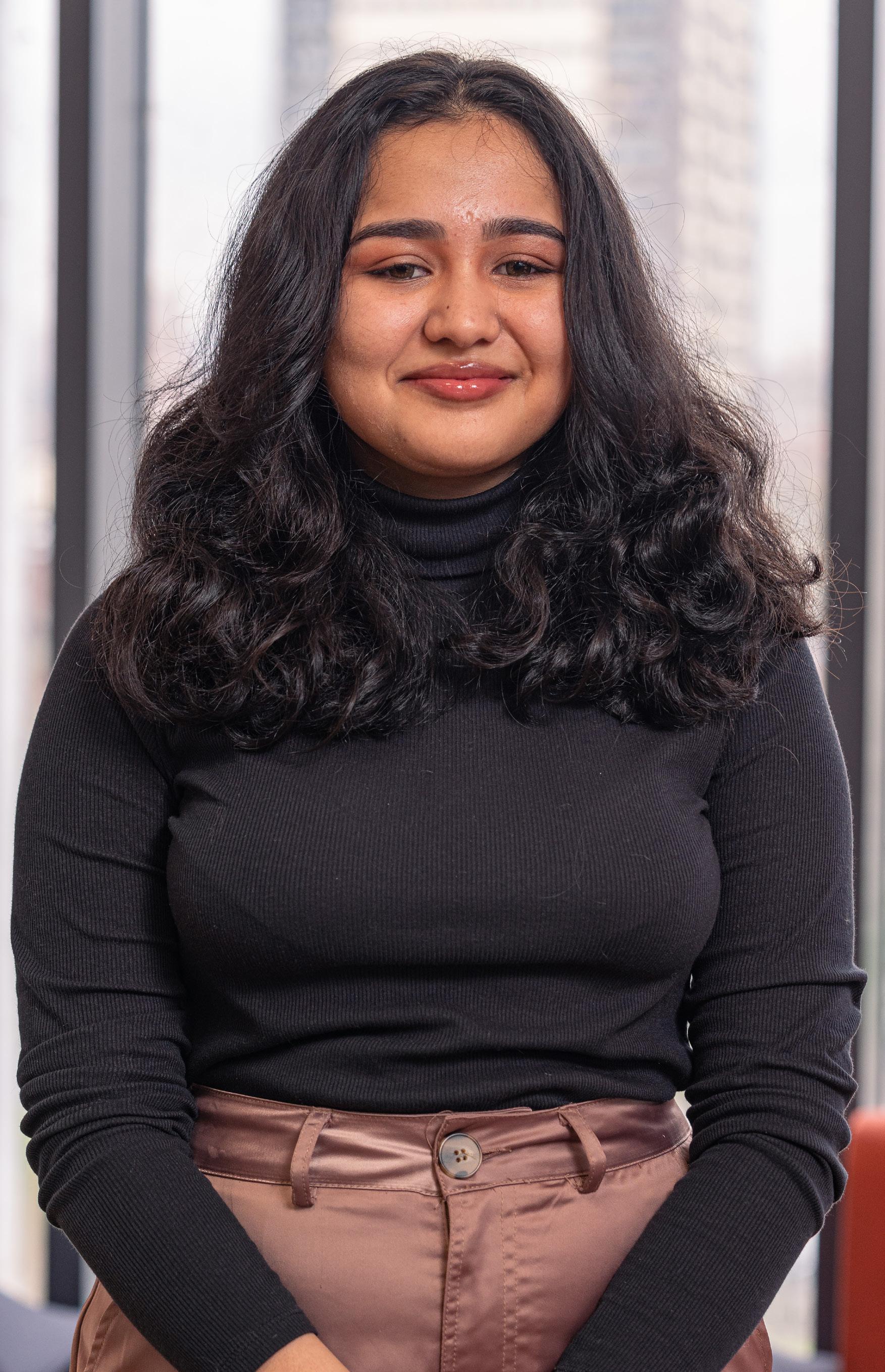
SUBJECTS MUSIC A level
WHAT IS MUSIC?
A level Music is a varied and interesting course that will develop both your theoretical and practical music skills. You will improve your understanding of music theory, as well as gaining the opportunity to use industry-standard software to create your own compositions. As part of your future development, you will have weekly one-to-one tuition on your chosen instrument.
WHY STUDY THIS SUBJECT?
If you are looking to understand the building blocks of music, develop practical musicality, and transform your ability as a composer, then you should study Music at RSFC.
WHO IS THE SUBJECT SUITABLE FOR?
To study Music at RSFC, you must have at least achieved a 5 in GCSE Music and have an in-depth understanding of music theory. You must also be at least grade 5 on your chosen instrument. Music is suitable for students who are looking to pursue a career in music or want to increase their knowledge in a subject that they are passionate about. The subject is also an excellent choice for anyone hoping to work in the creative arts sector.
WHAT CAN YOU EXPECT FROM MUSIC?
A level Music is a rigorous course intended for students interested in classical and popular music theory. As part of this subject, you will develop sheet music analysis skills, compositional practice, and an appreciation of a wider historical context of music. Instrumental tuition will afford you oneto-one support and encouragement, challenging you to practice pieces between grades 6-8.
KEY TOPICS
YEAR 1
In the first year, you will study music and compositional theory, alongside historical developments in the symphony (1750-1900), as well as the rock and pop genre (1960-2000). You will also produce a ‘free’ composition of your own creation.
WHAT CAN I DO WITH A QUALIFICATION IN MUSIC?
A level Music is a broad qualification which creates a range of future opportunities. It will build the foundations required to become a professional musician, an academic specialist in composition or musicology and other roles within the creative arts and media sector. Many students who have studied A level Music at RSFC have subsequently gone on to performance colleges, such as the Royal Northern College of Music, British and Irish Modern Music Institute and Leeds College of Music.
HOW IS THE SUBJECT ASSESSED?
This subject is assessed through a combination of performance, coursework and external examinations. You will complete several mock exams throughout the course but in your final year you will have one performance assessment and one written assessment. All coursework will be submitted in your final year.
YEAR 2
In the second year, you will consolidate your knowledge from the first year and learn about twentieth century classical music, as well as producing a set classical composition from the examining body. You will undertake performance and written exams and submit all of your coursework for the two-year period.
ENTRY REQUIREMENTS
College entry requirements apply as detailed on page 29. In addition, a grade 5 or above in GCSE Music and a grade 5 or above on a musical instrument.
Studying Music has been an enriching experience. The rigorous training, guidance from experienced tutors and opportunities to perform have expanded my musical repertoire and nurtured my passion for artistic expression.
 Jacob Jackson
Jacob Jackson
MUSIC
SUBJECTS PHYSICAL EDUCATION A level
WHAT IS PHYSICAL EDUCATION?
A level PE aims to provide you with an understanding of a range of topics that impact on peak athletic performance. These range from using learning theories to explain how performers learn skills, looking at how anxiety and arousal affect novice and elite performers, through to an in-depth review of how the body and mind work before, during and after performance. Although PE is a theoretical course, you can still expect to engage in some physical activity in your second year, with your practical ability being assessed as part of your non-examined assessment.
WHY STUDY THIS SUBJECT?
With the three main disciplines of many sportsrelated degrees being physiology, psychology and biomechanics, A level PE aims to help students apply these principles to their own performance and elite athletes’ performances. As well as developing an outstanding knowledge of PE, you will gain numerous analytical and evaluative skills that are highly sought after at university and for future employment.
WHO IS THE SUBJECT SUITABLE FOR?
If you enjoy sport, want to learn more about the science behind sport, and have a desire to progress onto degree-level study in the field of sport and exercise, this course is for you.
WHAT CAN YOU EXPECT FROM PHYSICAL EDUCATION?
You can expect engaging lessons, predominantly in the classroom, that give you an excellent understanding of the founding principles of sports science: physiology, psychology, and biomechanics. You will also delve into the effects of modern-day technology on athletes’ performance. From VAR to assist officials, to enhancements in drugs such as anabolic steroids and EPO. You will leave as a well-rounded student with an expansive knowledge of issues and processes that impact athletes’ performance.
WHAT CAN I DO WITH A QUALIFICATION IN PHYSICAL EDUCATION?
Achieving an A level in PE puts you in a great position to progress onto sports-related degrees, such as Sport and Exercise Science; Physiotherapy; Strength and Conditioning; and Nutrition and Dietetics. Although these degrees are specifically related to the subject, the skills you will learn on the course are beneficial when progressing onto any degree course. With the skills also being highly regarded by many employers, it positions you well for a range of careers.
HOW IS THE SUBJECT ASSESSED?
This subject is assessed through a combination of coursework and two external examinations.
70% Examination
30% Coursework
KEY TOPICS
YEAR 1
Skill acquisition
Physiology
Sports psychology
ENTRY REQUIREMENTS
YEAR 2
Movement analysis and biomechanics
• Sport and society
• Improving personal performance (NEA)
College entry requirements apply as detailed on page 29. In addition, you must play a sport at a competitive level.
Studying PE has helped me to learn more about the human body and how it works. The teachers deliver content using methods that make the information easier to understand. A lot of support is given to students in order for us to succeed.
 Kate Gilbertson
Kate Gilbertson
PHYSICAL EDUCATION
SUBJECTS PHYSICS A level
WHAT IS PHYSICS?
Physics is about questioning how the world around us works and looking for answers through a combination of experiments and theoretical work. Physics is used to answer some of our most fundamental questions relating to our origins and existence. It is a mathematical course, using formulae and logic to solve problems, predict events and describe observable phenomenon.
WHY STUDY THIS SUBJECT?
Physics enables you to apply models and formulae to understand the key concepts behind everyday things. For example, building structures such as bridges, looking at the electronic components used within modern technology, how subatomic particles interact with each other and the fundamental forces of the universe that act as the building blocks of life.
WHO IS THE SUBJECT SUITABLE FOR?
There is a lot of new terminology to learn, so independent study skills and a good level of motivation are vital. If you enjoy Mathematics and Physics at GCSE and like to see a real-world application of your skills, Physics is the subject for you.
WHAT CAN YOU EXPECT FROM PHYSICS?
You will challenge your ability to use logic and mathematics to solve problems and develop new ideas, and there are many opportunities to finetune your practical skills throughout the course. You will learn new terms and theories to support your development, and benefit from external exposure to subject experts and trips that will enhance your understanding.
WHAT CAN I DO WITH A QUALIFICATION IN PHYSICS?
An A level in Physics is a valuable one and can lead to university degrees in Physics, Mathematics, Engineering, Geography and Medical Science. It shows a high level of numeracy, logic and reasoning, and is desirable for universities and employers. Physics can lead to careers not just in science but in other industries, for example visual effects for films, modelling the economy, journalism and many more.
HOW IS THE SUBJECT ASSESSED?
You will complete three examinations at the end of the two-year course and be assessed throughout the year on your practical skills.
KEY TOPICS
YEAR 1
Mechanics
Materials
Waves
Basic electricity
Quantum phenomena and particle theory
YEAR 2
Circular motion
• Simple harmonic motion
100% Examination
• Gravitational, electric and magnetic fields
• Capacitance
• Thermal physics
• Nuclear physics
• Astrophysics
ENTRY REQUIREMENTS
College entry requirements apply as detailed on page 29. In addition, a grade 6-6 or above is required in GCSE Combined Science or grade 6 in two of GCSE Biology, Chemistry or Physics. Physics students MUST also study A level Mathematics.
Studying Physics has allowed me to explore the secrets of the universe where every equation and concept helps us understand the fascinating nature of the world around us. The teachers offer excellent support which enables you to reach your potential.
Areeb Ali
PHYSICS
SUBJECTS POLITICS A level
WHAT IS POLITICS?
Politics is the study of current affairs and governance, involving discussions around a variety of political issues and debates. Politics is directly relevant in our lives and by studying it you will be enhancing your knowledge and understanding of the world around you and encouraging you to become an active citizen. Politics isn’t just about what’s going on in the news; you will also develop a deeper understanding of core ideologies and discover from where politicians derive their beliefs and principles.
WHY STUDY THIS SUBJECT?
Politics gives you the chance to study topics which enhance your understanding of the world today, equipping you with the knowledge to engage in discussion as well as successfully defend your own arguments in extended essays. You will gain vital analytical skills to enable you to tackle an expanding era of ‘fake news’ as well as become successful in your chosen field. Politics complements an array of subjects such as Law, English, History, Philosophy and Sociology; however, it is also a great contrast for students studying Science who want to understand how the UK and US work.
WHO IS THE SUBJECT SUITABLE FOR?
Politics is an exciting and valuable course aimed at those motivated to ‘get involved’ and expand on their knowledge of current affairs and the workings of UK and US democratic systems.
KEY TOPICS
YEAR 1
Democracy and political participation
• Political parties
• Voting behaviour and the media
• UK Parliament
• Prime Minister and the Executive
ENTRY REQUIREMENTS
WHAT CAN YOU EXPECT FROM POLITICS?
As turbulent as Politics has become there has never been a better time to study it. Debating and discussing, just about everything, is central to this course. You should expect to use the knowledge that you gain from the classroom to make arguments about democracy, political participation, government and more. Throughout the course you will refine your initial ideas into well-structured and robust arguments; however, it is also vital that you are prepared to listen to and respect alternative points of view. Politics is a captivating subject which continues to evolve, and this means you will be required to keep up-to-date with current affairs, using this knowledge to create persuasive arguments.
WHAT CAN I DO WITH A QUALIFICATION IN POLITICS?
Many of those who study Politics at A level have continued their political studies at university. Whether the subject is enjoyed as an interesting A level or taken to degree level, it can and often does lead to exciting and diverse careers such as positions in law, the civil service, journalism and careers in the media, the police and teaching.
HOW IS THE SUBJECT ASSESSED?
You will complete examinations at the end of the two-year course. Each paper is made up of essay questions. There are 3 papers:
Paper 1 : UK politics and core political ideas
Paper 2 : UK government and non-core political ideas
Paper 3 : Comparative politics - with US politics
100% Examination
YEAR 2
US Presidency
• US Congress
• US Supreme Court
• US race relations
College entry requirements apply as detailed on page 29. In addition, a grade 5 or above is required in GCSE English Language.
Politics has allowed me to formulate and develop complex opinions surrounding contemporary issues in the world. It has taught me how to share my view in a critical way and analyse the political landscape of Britain.
 Emily Latham
Emily Latham
POLITICS
SUCCESS
FIZA ALI

COURSES:
Biology
Chemistry
Psychology
HOLLINGWORTH ACADEMY
RESULTS:
A B A
DESTINATION:
Bangor University -
Psychology
REMY TAYLOR TODMORDEN HIGH SCHOOL
SUBJECTS PSYCHOLOGY A level
WHAT IS PSYCHOLOGY?
Psychology is the study of the human mind and behaviour, providing a fascinating insight into the reasoning behind our actions. At its core, psychology seeks to understand why we behave the way we do and how our mental processes shape our interactions with the world. It aims to answer the most interesting questions in life: Why do people develop mental illness? What is an addiction? How can we explain addictive behaviour? Would humans obey an authority figure, even if fulfilling their orders would cause harm? You will learn about all this and more and think about how it applies to our everyday lives.
WHY STUDY THIS SUBJECT?
Studying Psychology provides a deep understanding of human behaviour through the exploration of a variety of psychological theories and concepts. The course will not only develop your critical thinking and analysis skills, but it will also help you grasp factors that influence our thoughts, emotions and actions. From investigating cognitive processes, to developing an understanding of complex mental health conditions and social behaviours, this course offers a comprehensive view of human psychology that will equip you with transferable skills that are desirable for a wide variety of university courses and future career pathways.
WHO IS THE SUBJECT SUITABLE FOR?
If you are eager to understand the causes and motivations for a person’s behaviour, Psychology is the course for you.
KEY TOPICS
YEAR 1
Attachment
• Memory
• Social influence
• Psychopathology
• Research methods
ENTRY REQUIREMENTS
WHAT CAN YOU EXPECT FROM PSYCHOLOGY?
Through interactive and engaging lessons, you will develop knowledge of psychological theories and a variety of approaches to explain human behaviour. You will have the opportunity to engage in class discussions, practical experiments and develop your critical analysis skills as you evaluate the value of each psychological theory and its contribution to our understanding of human behaviour. The Psychology department fosters a supportive atmosphere inside and outside of the classroom to help you build the skills and psychological knowledge you will need to be successful on this course. Furthermore, Psychology provides a solid foundation for higher education and future employment opportunities.
WHAT CAN I DO WITH A QUALIFICATION IN PSYCHOLOGY?
Psychology can help your career either directly or indirectly. Of course, if you wish to become a psychologist, therapist or mental health worker, this A-Level is of direct value. Many Psychology graduates tend to build careers in education, the police, social work and further research. Psychology provides you with life skills that are transferable to any career.
HOW IS THE SUBJECT ASSESSED?
You will complete three examinations at the end of the two year course. All examinations include a range of multiple choice, short answer and extended writing questions.
100% Examination
YEAR 2
Approaches to explaining behaviour
• Biopsychology
• Schizophrenia
• Addiction
• Relationships
College entry requirements apply as detailed on page 29.
The support that the Psychology team offers is crucial as they push every student to achieve their very best on a daily basis. The lessons are always engaging and supportive in a way which helps you to prepare for life after college.
 Maham Irfan
Maham Irfan
SUBJECTS SOCIOLOGY A level
WHAT IS SOCIOLOGY?
Sociology is the study of how society works. It explores how the culture and groups we live in shape and control human behaviour. Sociology investigates the link between media and crime, why people join cults or become terrorists, why education can be damaging to young people, why the rest of the world is becoming more religious while Britain’s religious beliefs decline.
WHY STUDY THIS SUBJECT?
You should study Sociology if you want to question why people behave and think the way they do. For instance, a person’s gender and ethnicity can affect the way they dress, the subjects they pick at school and roles they perform in the family. This subject will make you more socially aware and help you to think independently and critically about who has power in society, who creates conflict and ask how to solve problems such as poverty and racial discrimination.
WHO IS THE SUBJECT SUITABLE FOR?
Do you have an interest in current affairs or want to work with people who may be disadvantaged in society and want to find ways to improve their situations? Do you have a critical eye and a thirst for knowledge and answers to key issues in modern society? Then this is the subject for you!
KEY TOPICS
YEAR 1
Introduction to sociological perspectives:
Paper 1 : Education with theory and methods;
• Sociological perspectives on the role of education
• Differential achievement in education – why do some groups perform better or worse in education?
• Educational policies
• Research methods
• Methods in context
Paper 2 : Beliefs in society;
• Social groups and levels of religiosity
• Sociological perspectives on the role of religion
• Religious organisations’ global context
• Secularisation
• Science and ideology
ENTRY REQUIREMENTS
WHAT CAN YOU EXPECT FROM SOCIOLOGY?
Expect the best and be prepared to be surprised. Sociology will leave you questioning everything and everyone around you. It will open your eyes and allow you to look at the world in a way you have never seen it before. In a safe, non-judgmental environment, you will have the opportunity to explore these issues, get involved in debates and develop life skills.
WHAT CAN I DO WITH A QUALIFICATION IN SOCIOLOGY?
Students with a Sociology A level can enter careers in law, civil service, teaching, the criminal justice system, journalism, politics, HR and social work with many of our students going on to study Sociology, Criminology or Law at degree level. The skills developed through completion of the course will be invaluable in higher education and employment.
HOW IS THE SUBJECT ASSESSED?
You will be assessed at the end of two years through the completion of three examinations.
100% Examination
YEAR 2
Paper 2 : Families and households;
• Sociological perspectives on the role of the family
• Family diversity
• Family social policies
• Domestic division of labour
• Childhood
• Demography
Paper 3 : Crime and deviance with theory and methods;
• Theories of crime
• Reasons why some social groups commit crimes
• Issues in crime such as punishment and victimology
• Contemporary issues in crime such as green crime and the media
• Debates and theories
College entry requirements apply as detailed on page 29.
Sociology has opened my mind through its in-depth study of theories that can be applied to the society that we live in. It has changed my perspective, making me question affairs and issues that are ongoing in our world today.
Zainab Laraib
SOCIOLOGY
SUBJECTS SPANISH A
WHAT IS SPANISH?
level
Spanish is the second most spoken language in the world with over 400 million native speakers and official status in 21 countries in South, Central and North America, as well as Africa and Europe. Its cultural richness goes hand-in-hand with its potential in the world of work. While Spain is still the UK’s eighth largest goods export market, the real scope for growth is in the emerging countries of Latin America: Argentina, Chile, Colombia and Mexico.
WHY STUDY THIS SUBJECT?
Studying a foreign language teaches you all the skills that employers want in their employees; an analytical mind, good thought processes, cultural and intercultural awareness, good communication and the ability to be a good team player.
Speaking Spanish might increase your salary by as much as 20% and it will give you a head start on any other potential employees.
WHO IS THE SUBJECT SUITABLE FOR?
If you are interested in languages and communication and you enjoy learning about other cultures, then our Spanish course is for you. Currently, fewer and fewer students of your age are studying languages; by taking A level Spanish you will be placing yourself in an elite group of people whose linguistic skills will no doubt be highly sought after later in life.
WHAT CAN YOU EXPECT FROM SPANISH?
This subject will help you to develop your interest and awareness of Hispanic language and culture and therefore to gain an understanding of a globalised word. With this A level, you will not only learn how to communicate at a higher level in Spanish, but you will also develop your general study skills. All students are encouraged to take risks and learn from their own mistakes, so step out of your comfort zone and experience the joy of speaking another language.
WHAT CAN I DO WITH A QUALIFICATION IN SPANISH?
There will be a range of opportunities open to you where you can continue to use and further develop your language skills and knowledge of contemporary society. Some students choose to study degree courses in languages; others pursue a degree in another subject but choose a language option alongside it. Regardless, if you are interested in career paths such as business, diplomacy and foreign relations, travel and tourism, translation or journalism, learning Spanish is a great option for you; come and join us!
HOW IS THE SUBJECT ASSESSED?
Paper 1 : Listening, reading and writing
Paper 2 : Written response to film and text (or two texts)
Paper 3 : Speaking — individual research project and discussion
50% Listening, Reading, Writing
20% Written Response
30% Speaking
KEY TOPICS
YEAR 1
Modern and traditional values in Spanish societies
• Gender equality
• Influence of cyberspace and modern idols nowadays
• Regional identity in Spain and cultural heritage in the Hispanic world
You will also study one cinematographic work:
‘El Laberinto del Fauno’
ENTRY REQUIREMENTS
YEAR 2
Immigration
• Racism
• Integration across Hispanic societies
• Youth as citizens of tomorrow
• Monarchies and dictatorships in the Hispanic world and social movements that have changed Spanish-speaking countries
Study of a literary work:
‘La Casa de Bernarda Alba’
College entry requirements apply as detailed on page 29. In addition, a grade 5 or above is required in GCSE Spanish.
Learning Spanish has really deepened my love for languages. I have loved our focus on learning about the Hispanic world. Overall, it has been an amazing experience that has helped me steadily improve my skills and expand my knowledge.
 Katie Fagan
Katie Fagan
SPANISH
SUBJECTS STATISTICS A level
WHAT IS STATISTICS?
Statistics is used in everything from predicting the weather to deciding if a new drug will cure a serious illness, and everything in between. Statistics is the study of data, how to gather it all the way through to how to make accurate predictions and working out the chance of those predictions going wrong. Statistics is now used so widely that many employers would see a qualification in Statistics as a huge advantage.
WHY STUDY THIS SUBJECT?
The course provides an excellent overview of many different statistical techniques and how they are applied to real-life contexts. An ideal complement to other statistically rich subjects to develop deeper understanding. Statistics A level relates to the collection, analysis, interpretation or explanation and presentation of data. This branch of mathematics is used in situations involving variability or uncertainty, such as weather forecasting, finance or assessing the effects of medicines.
WHO IS THE SUBJECT SUITABLE FOR?
Statistics is suitable for anyone who wants to use data to form conclusions. It is heavily relied upon in the field of research. It goes especially well with A levels in Biology, Geography and Psychology and links directly into further academic study in these areas.
WHAT CAN YOU EXPECT FROM STATISTICS?
You will develop a deeper understanding of how data can be used, the processes by which it can be analysed and the predictions that can be made from it. You will study the Statistical Enquiry Cycle and learn to apply this to real-life data.
WHAT CAN I DO WITH A QUALIFICATION IN STATISTICS?
You may be surprised at just how many interesting jobs there are for statisticians, such as an accountant, data analyst, and statisticians in a variety of fields. Statistics is now used so widely that many employers would see a qualification in this subject as a distinct advantage.
HOW IS THE SUBJECT ASSESSED?
There are three exams at the end of the course, all are equally weighted.
Paper 1 : Data and probability
Paper 2 : Statistical inference
Paper 3 : Statistics in practice
100% Examination
KEY TOPICS
YEAR 1
• Numerical measures, graphs and diagrams
• Probability
• Sampling
• Probability distributions
• Normal distribution
• Correlation and linear regression
YEAR 2
• Confidence intervals
• Exponential and Poisson distributions
• Hypothesis testing
• Contingency tables
• Non-parametric tests
• Experimental design
ENTRY REQUIREMENTS
College entry requirements apply as detailed on page 29. In addition a grade 5 or above in GCSE Mathematics and a grade 4 or above in GCSE English Language is required.
STATISTICS

THEOLOGY, PHILOSOPHY & ETHICS A
level
WHAT IS THEOLOGY, PHILOSOPHY & ETHICS?
Theology, Philosophy & Ethics (TPE) at RSFC is the study of religion from a philosophical, ethical and Christian perspective. It considers ancient and contemporary ideas surrounding morality.
WHY STUDY THIS SUBJECT?
TPE is a traditional subject, which is highly regarded by universities. It is essential in an evolving world which is increasingly concerned with good ethical practices, diversity and the need to understand different cultural and religious viewpoints for social harmony.
WHO IS THE SUBJECT SUITABLE FOR?
If you have an interest in philosophical concepts, want to learn more about religion and have an open-mind, this is the subject for you!
WHAT CAN YOU EXPECT FROM THEOLOGY, PHILOSOPHY & ETHICS?
You can expect highly engaging lessons, lively discourse, debate, creativity and controversial subject matter. The TPE A level is split into three components: philosophy of religion, religious ethics, and developments in Christianity. It is an essay-based subject, which requires lots of critical thinking, discussion, debate and persuasive writing. There are overlaps with many other exciting subjects such as Psychology, Sociology and Business.
KEY TOPICS
Philosophy or Religion: Ancient philosophical influences; soul, mind and body; arguments for God’s existence; the problem of evil; religious experience; religious language; the nature or attributes of God.
Religion and Ethics: Normative ethics (natural law, situation ethics, Kantian ethics and Utilitarianism), applied ethics (euthanasia, business ethics and sexual ethics), conscience and Meta ethics.
WHAT CAN I DO WITH A QUALIFICATION IN THEOLOGY, PHILOSOPHY & ETHICS?
TPE will support your progression to higher education and employment in a variety of roles and sectors. You will develop a wide range of transferable skills to support you in your career. Many students have progressed to study Medicine, Journalism, Teaching, Nursing and Business, to name just a few.
HOW IS THE SUBJECT ASSESSED?
Assessment is through examination at the end of the two years. There are three papers:
Paper 1 : Philosophy of religion
Paper 2 : Religious ethics
Paper 3 : Developments in Christian thought
100% Examination
Developments in Christianity Thoughts: Augustine’s reaching on human nature; knowledge of God, death and the afterlife; the person of Jesus; liberation theology and Marx; the challenge of secularism; Christian moral action; Christian moral principles; gender and society/theology; religious pluralism and society/theology.
ENTRY REQUIREMENTS
College entry requirements apply as detailed on page 29. In addition, a grade 5 or above is required in GCSE English Language.
TPE has encouraged me to explore new and interesting ideas, helping me to develop both my critical thinking and essay writing. Each lesson provides the opportunity for engaging discussions, which is something I have found to be unique about this subject.
 Jennifer Schofield
Jennifer Schofield
THEOLOGY, PHILOSOPHY & ETHICS
WORKING WITH PARENTS & CARERS
Students need to be given independence and responsibility for their own learning to prepare them for their next steps to university or employment. We provide this freedom in a very supportive context, with close monitoring and guidance. We believe it is essential that, as parents and carers, you should be kept fully informed and up-to-date about your young person’s progress while at Rochdale Sixth Form College.
We will keep you involved through a variety of methods, including Parents’ and Carers’ Evenings to discuss
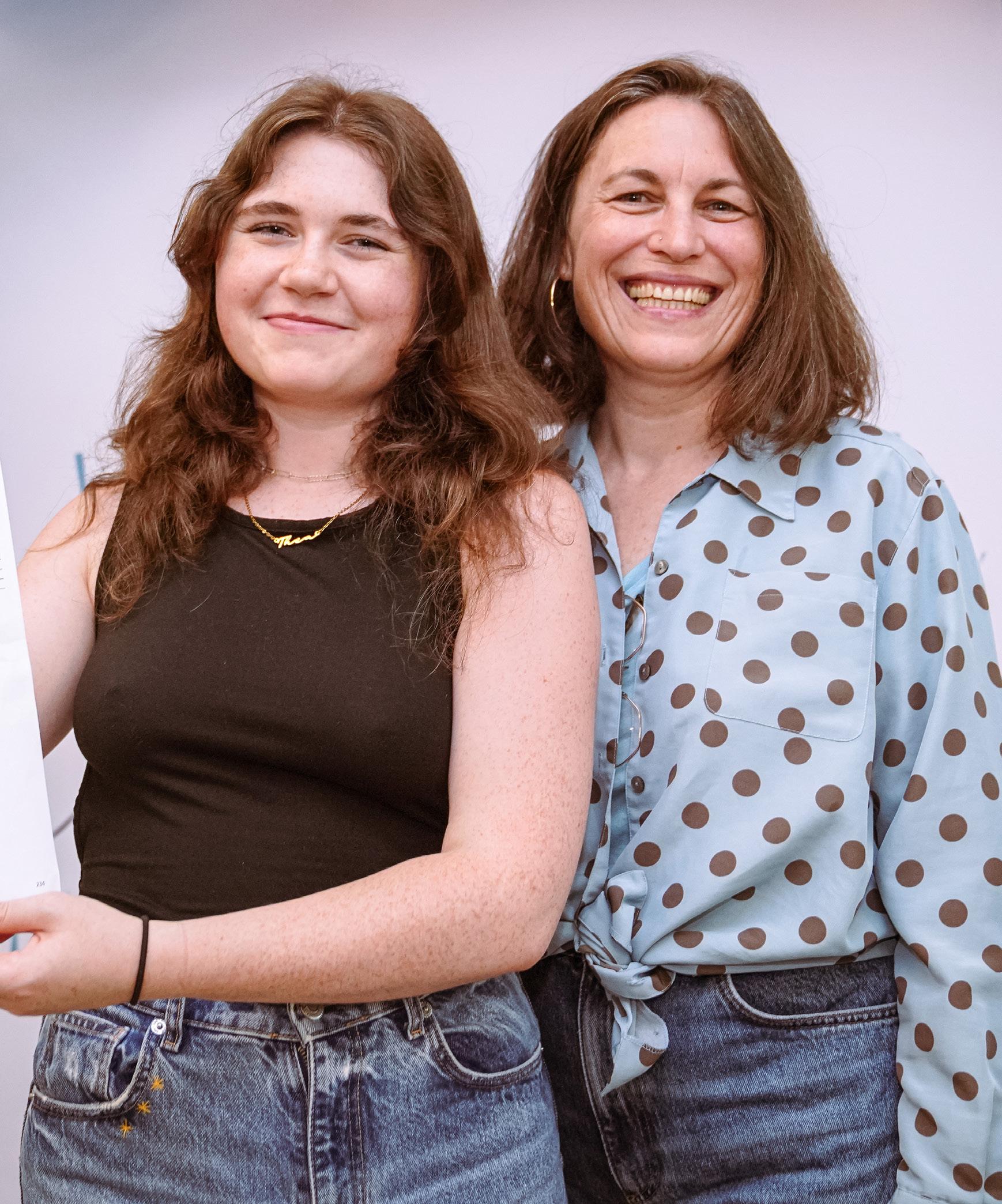
academic progress with subject teachers; action plans; newsletters and online access to attendance data and current targets via our online portal, Cedar.
We ask that you keep in contact with your young person’s Student Performance and Development Leader (SPDL), telephone Student Administration in the case of absences and do not go on holiday in term time. We ask too that you support us to help your young person find the right balance between their social life, paid work and study.
FINANCIAL SUPPORT
BURSARY
Young people in the defined vulnerable groups are eligible for a bursary of up to £1,200 a year, which equates to approximately £30 per week during term time.
The defined vulnerable groups are students who are:
In care
Care leavers
Receiving Income Support or Universal Credit (UC) because they are financially supporting themselves or care for someone who is dependent on them and living with them, such as a child or partner
Receiving Disability Living Allowance or Personal Independence Payments in their own right as well as Employment and Support Allowance or UC in their own right
FREE COLLEGE MEALS
DISCRETIONARY BURSARY
This fund is used to assist students who may benefit from financial assistance to complete their course. Any such contributions will only be made towards costs incurred for attending college (the 16–19 bursary does not provide childcare funding – please refer to the Care to Learn website for under-20 childcare funding). The bursary fund is limited and allocations will be based on financial need. Financial assistance will mainly be in the form of weekly credits on students’ ID cards for the purchase of meals in college, with the possibility of some additional cash payments.
Further assistance may be available for participation in trips and visits, the payment of exam re-sits or the purchases of other resources required for college activities. Allocations will not be made until a student is enrolled and achieves 100% attendance.
Eligibility for free meals is based on an assessment of household income. If you or your parents/carers are in receipt of one or more of the following benefits, you may be eligible for free meals:
Income Support
Income-based Jobseeker’s Allowance
Income-related Employment and Support Allowance (ESA)
Support under part VI of the Immigration and Asylum Act 1999
The guaranteed element of State Pension Credit
Child Tax Credit (provided you are not also entitled to Working Tax Credit and have an annual gross income of no more than £16,190, as assessed by His Majesty’s Revenue and Customs)
Working Tax Credit run-on – paid for 4 weeks after you stop qualifying for Working Tax Credit
Universal Credit – your household income must be less than £7,400 a year (after tax and not including any benefits you receive)
OUR PASS
Our Pass is a membership scheme for young people who live in Greater Manchester, and supports both school leavers and care leavers. Those eligible have the chance to become a member – and potentially enjoy two things:
First, free bus travel across Greater Manchester. For a one-off £10 fee, members can travel on most local buses, any day of the week, for free from the moment your pass is live until 31 August 2026.
Second, membership unlocks exclusive offers and experiences: discounts, special offers, free tickets, swimming and leisure passes, merchandise, taster sessions and much more.
ORDER YOUR CARD NOW
Create an account to order your card online at www.ourpass.co.uk. You can apply from May 2024 and can use your card automatically from 1 September 2024.
FAQs available at www.ourpass.co.uk


COLLEGE TRAVEL
COLLEGE TRAVEL SUBSIDY
LITTLEBOROUGH
OLDHAM
TRAIN ROUTES
BUS ROUTES
METROLINK ROUTES

20-MINUTE WALK TO RSFC FROM ROCHDALE TRAIN STATION
Rochdale Sixth Form College offer a discretionary subsidised travel scheme for students living outside of the Greater Manchester area. For more information on the College Travel Subsidy, please contact: bursary@rochdalesfc.ac.uk
METHODS OF TRAVEL TO RSFC: BUS
There are many bus routes across the borough and beyond that lead to RSFC.
All RSFC students living in the Greater Manchester area are eligble for FREE Travel through TFGM’s Our Pass scheme.

Our Pass is a FREE bus travel scheme for 16-18 year olds who live in Greater Manchester and offers discounts on tram travel too.
TRAIN
Purchasing the 16-17 Saver through thetrainline.com or 16-17saver.co.uk can reduce travel costs by 50%. Visit either of these websites for more information. (valid until your 18th birthday).
CAR
Please be aware that there is no on-site student parking available at RSFC. Chargeable car parks are available around the town centre within walking distance to the college.
BIKE
We have bike stands on the north side of the building for securing your bike while at college. Please ask us about travelling by moped or motorcycle.
YOUR JOURNEY TO RSFC
SEPTEMBER 2023
Read the prospectus and look at our website. Think carefully about the subjects you might want to study at RSFC.
RSFC staff will visit your school to talk to you about the application process, so please have your questions ready. You can also contact the college with your questions in a number of ways including email, telephone and via our social media channels.
Look out for our open events where you will be able to meet staff and find out what RSFC has to offer you.
DECEMBER 2023
Have you completed your application form yet? Don’t worry, you still have some time left. You might need to get some more advice about your subject choices from your teachers, parents/ carers or the careers office. Alternatively, you can give us a call.
Shortly after we have received your application, we will interview you for your place at RSFC. These interviews are informal and will give you further advice and support on your choices.
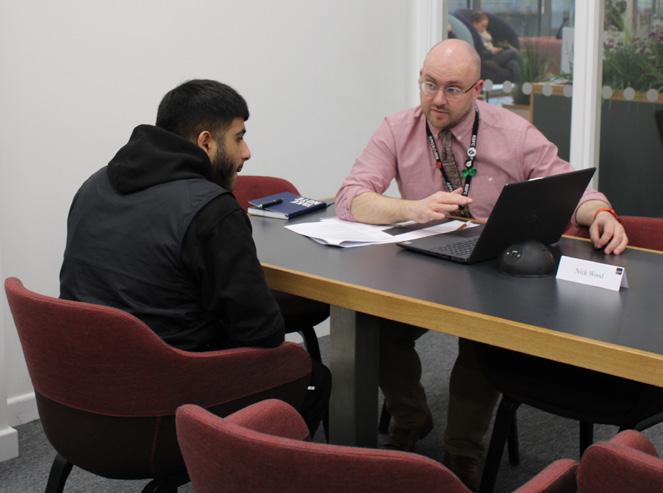
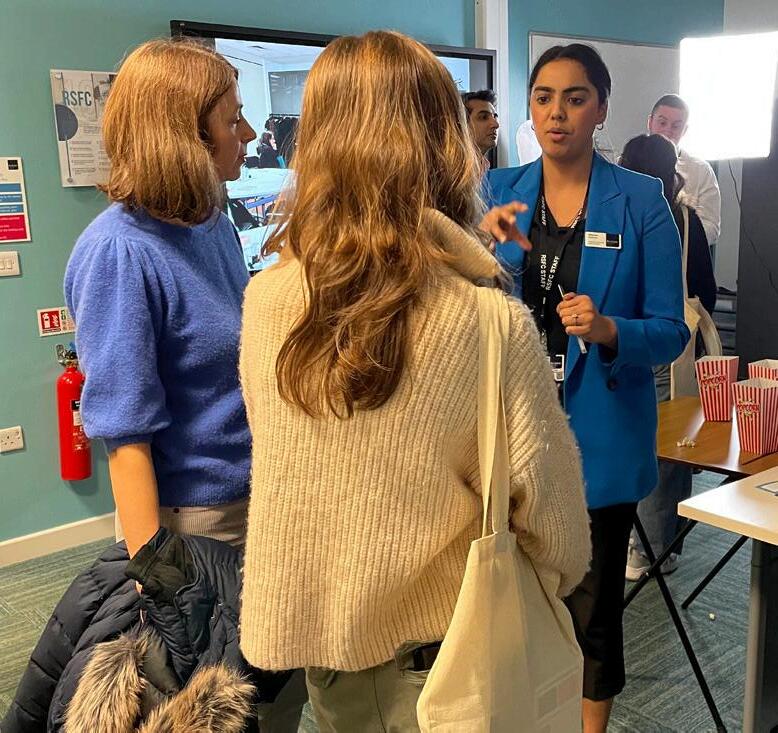
The deadline for applications from students is 12pm on Thursday 21 December 2023.
OCTOBER/ NOVEMBER 2023
Attend one of our open events on Saturday 14 October or Thursday 23 November 2023. See page 29 for more information.
MARCH 2024
You should have received an update on the progress of your application. If you haven’t heard from the college, please contact us.
JANUARY/FEBRUARY 2024
Students will be invited to an interview with a member of staff at the college or at your school.
IF YOU HAVE DECIDED THAT RSFC IS THE PLACE FOR YOU, YOU CAN NOW BEGIN COMPLETING THE APPLICATION FORM ONLINE AT: www.rochdalesfc.ac.uk
WE LOOK FORWARD TO WELCOMING YOU!
JULY 2024
We will be sending you some further information in the post about enrolment and what will be happening in your first few weeks of college.
You will be invited to our New Student Welcome Day. Attendance is a compulsory part of the enrolment process.
MAY 2024 GOOD LUCK IN YOUR GCSEs!
TO RSFC
SEPTEMBER 2024
Following your Enrolment Day, you will receive information and dates for the Induction Day and the first day of teaching.
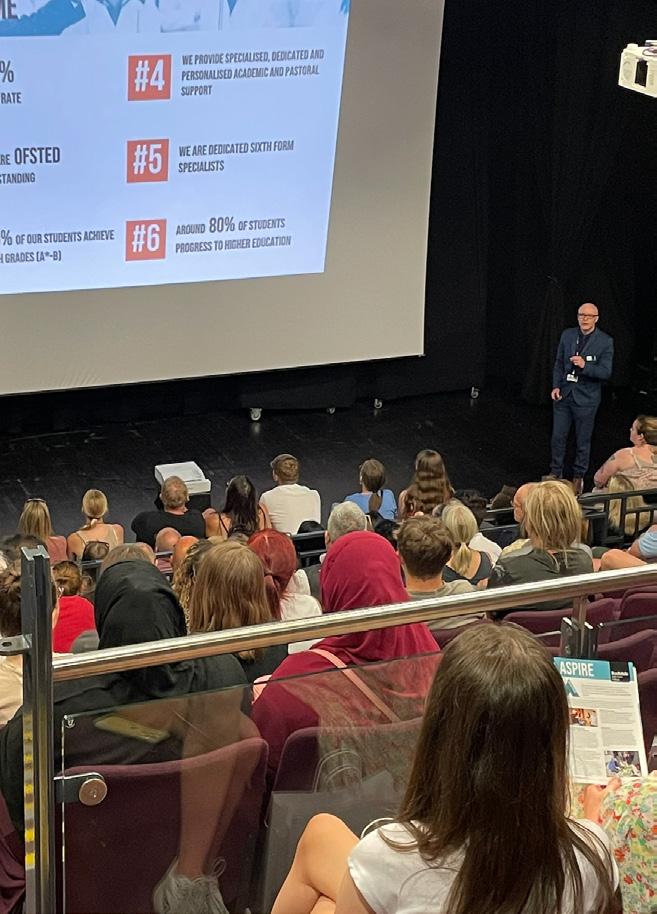
AUGUST 2024
GCSE RESULTS ARRIVE
It is now time to enrol at Rochdale Sixth Form College!
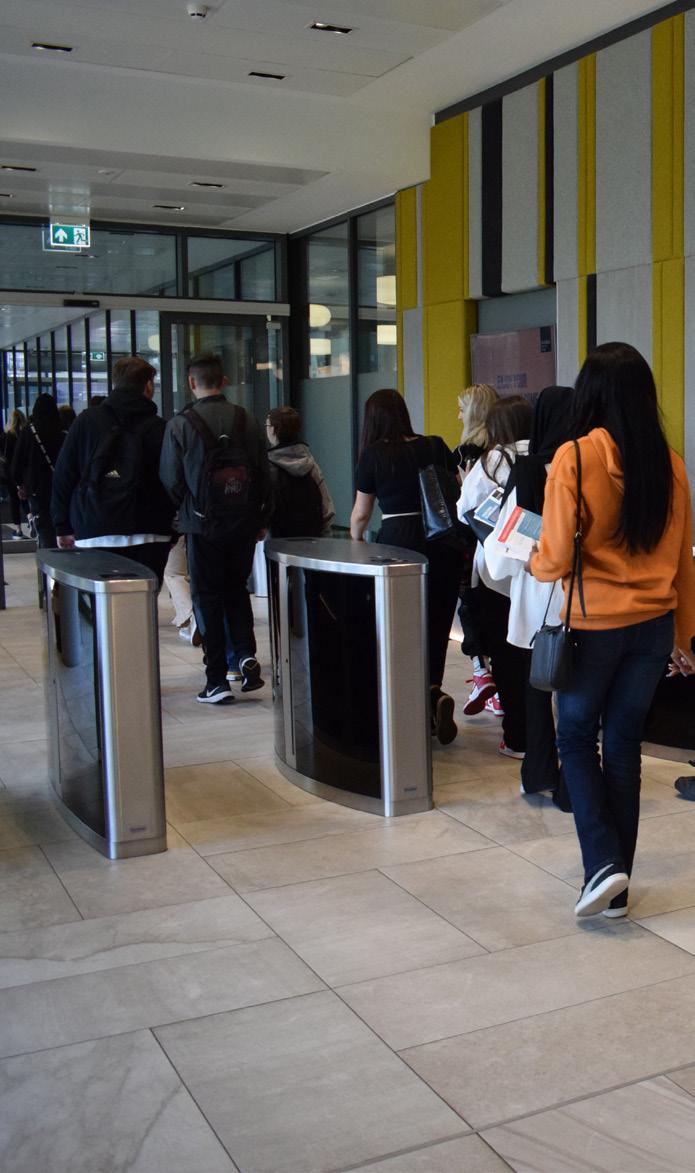
Our Enrolment days will be Thursday 22 and Friday 23 August 2024.
Please ensure that you are available on these dates as places cannot be guaranteed for those who do not attend.
ALUMNI ASSOCIATION
Rochdale Sixth Form College takes immense pride in nurturing strong connections with its students even after they have completed their A level studies. We recognise the value of maintaining a lasting relationship with our Alumni, and as such, extend a warm invitation for them to return to college. This initiative allows RSFC Alumni students to share their personal progression journeys with you, serving as a source of inspiration and motivation. We call this our Alumni Association.
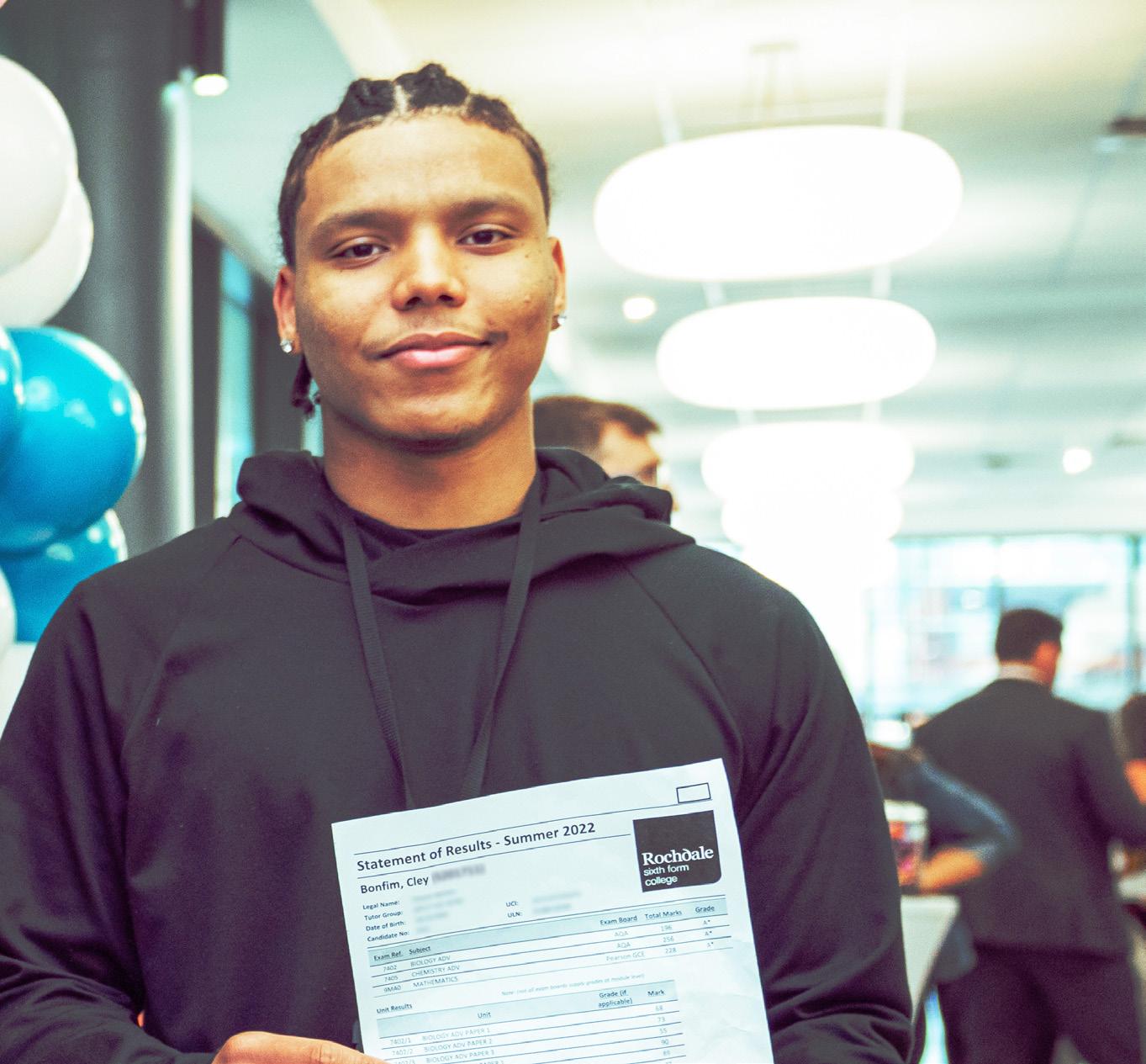
We firmly believe that the experiences and achievements of past students can greatly influence and guide the aspirations of the present ones. By inviting RSFC Alumni to share their stories, we aim to inspire and encourage you to pursue higher education, apprenticeships, or meaningful employment opportunities.
These gatherings provide a platform for RSFC Alumni to showcase their accomplishments and highlight the diverse paths they have taken since
leaving the college. By sharing their successes, challenges, and lessons learned, RSFC Alumni contribute valuable insights and practical advice. The personal touch of hearing first-hand accounts from former students who have navigated similar journeys can instill confidence and belief in you.
The Alumni Association also stay in contact with primary and secondary schools to establish a network that spans the entire educational journey. This collaboration enables us to provide a more tailored educational experience for you, ensuring your smooth progression and success. Through these ongoing relationships, we continue to make a positive impact not only on you but also on the wider educational community.
BONFIM 2020-2022
WHAT NEXT?
I look forward to starting my second year of university and can’t wait to experience more clinical opportunities whilst further developing my academic interests.
DAN BROCK 2017-2019
COURSES:
RESULTS: Business Economics PE
A B B
DESTINATION AFTER RSFC: IBM - Degree Apprenticeship in Business Management

WHAT NEXT?
My role at IBM as Business Management Consultant involves analysing organisations’ operations, identifying inefficiencies or areas for improvement, and developing strategies to optimise their processes, increase productivity, and achieve sustainable growth. I have worked in many different industries prior to this appointment, ranging from healthcare, energy, aerospace and defence, and nuclear power companies before my current position with IBM.
MAHA HAFEEZ 2017-2019
COURSES:
RESULTS: History English Literature Religious Studies
C C C
DESTINATION AFTER RSFC: Manchester Metropolitan UniversityLaw

RESULT:
2:1
WHAT NEXT?
I was keen to join the Civil Service and started researching roles in this field.
Following my degree, I applied to a job opening with the Ministry of Justice and have secured a position as a Civil Servant working for His Majesty’s Court and Tribunal service.
FREQUENTLY ASKED QUESTIONS
Q. I AM WORRIED ABOUT THE INTERVIEW –WHAT WILL IT BE LIKE?
A. The interview is very informal and enables you to ask any questions you may have. It provides an opportunity for the college to find out a little more about you and to ensure that your subject choices are right for you and your chosen future career. It isn’t anything to worry about!
Q. WHAT IS THE DRESS CODE AT RSFC?
A. One of the benefits of attending RSFC is not having to wear a uniform. We just ask that you dress in a manner appropriate to a purposeful and diverse learning environment.
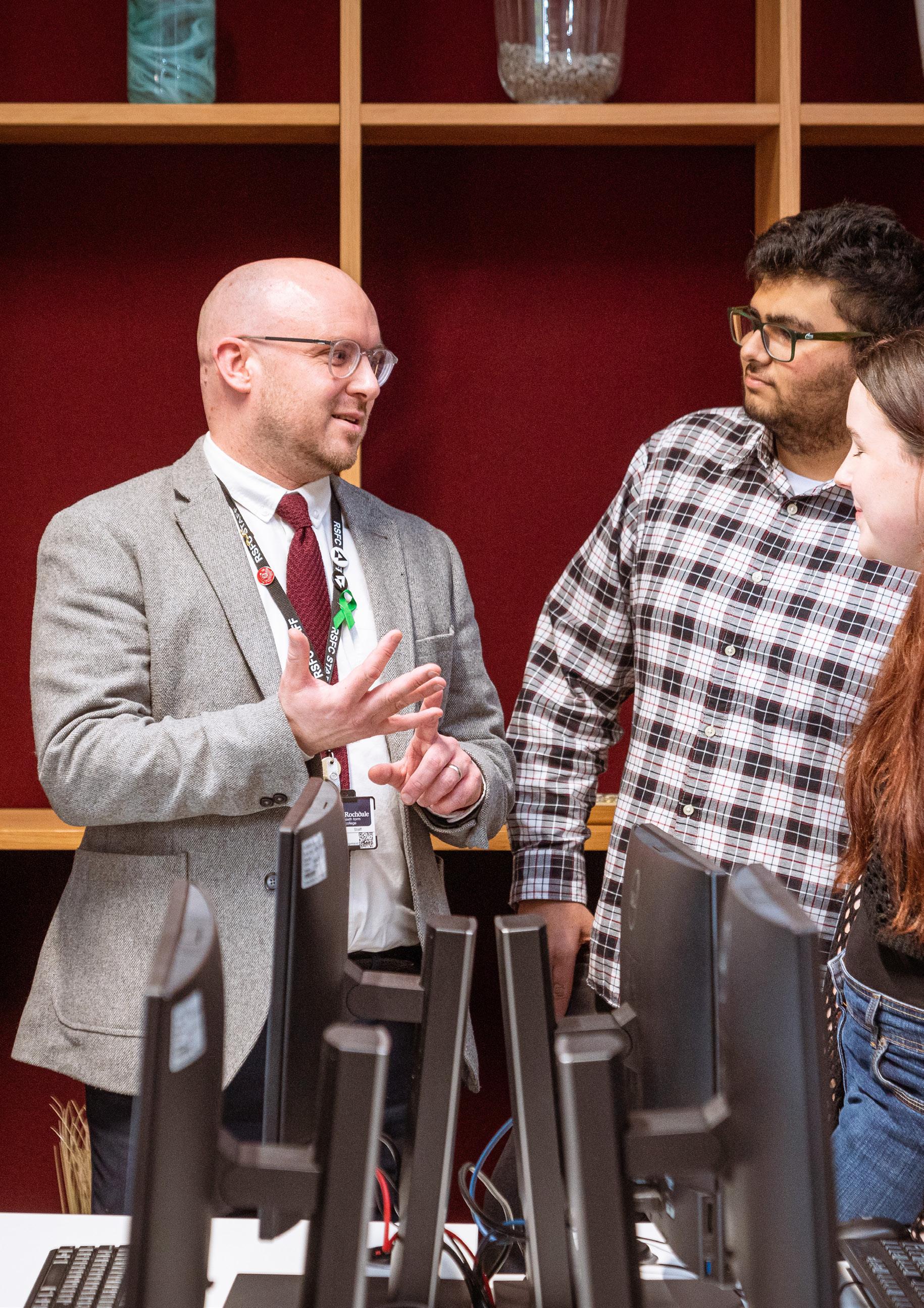
Q. WILL I RECEIVE SUPPORT AND GUIDANCE ABOUT MY PROGRESSION AFTER RSFC?
A. Yes. Your SPDL will work with you to support your next steps, whether that be to university, apprenticeship or employment. The college will also provide an opportunity for you to undertake a work placement.
HOW DO I APPLY FOR A PLACE AT RSFC?
STEP ONE
Visit our website: rochdalesfc.ac.uk where further subject information can be found. Attend one of our open events in October and November.
Complete your RSFC application. This can be found online at: rochdalesfc.ac.uk 2
STEP TWO

STEP THREE
Attend your interview at RSFC where you will discuss your subject choices and future progression in detail. 3





